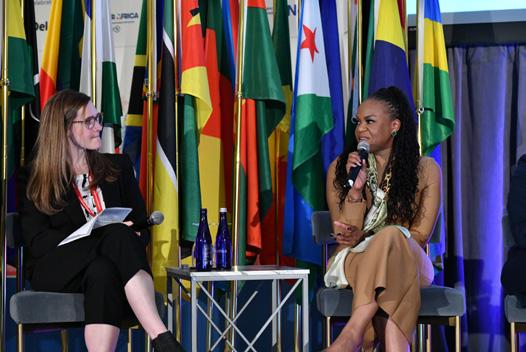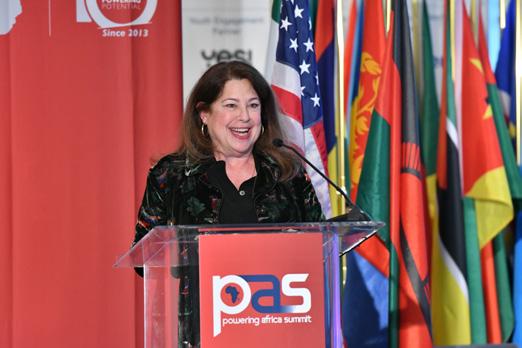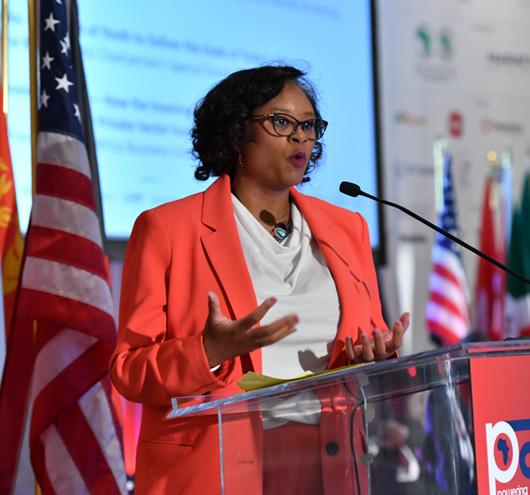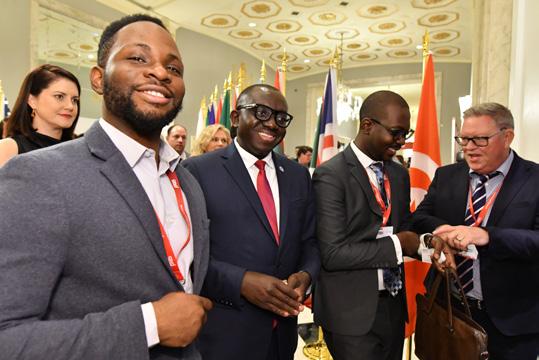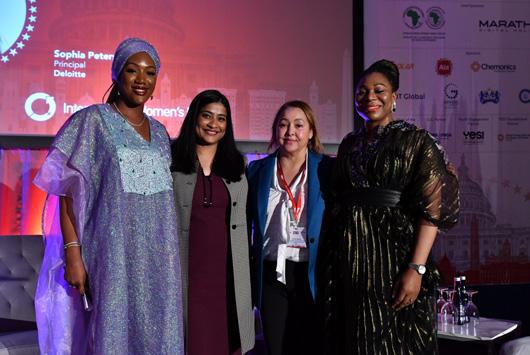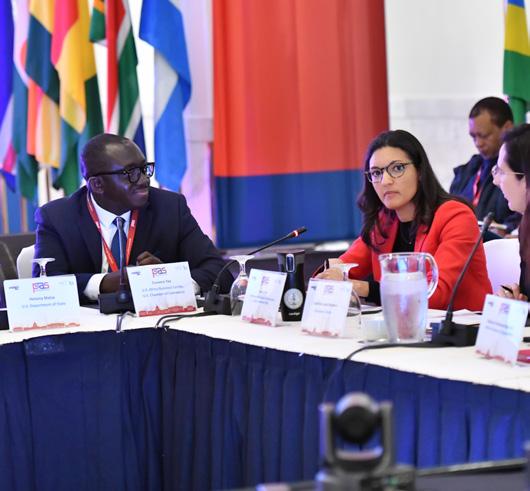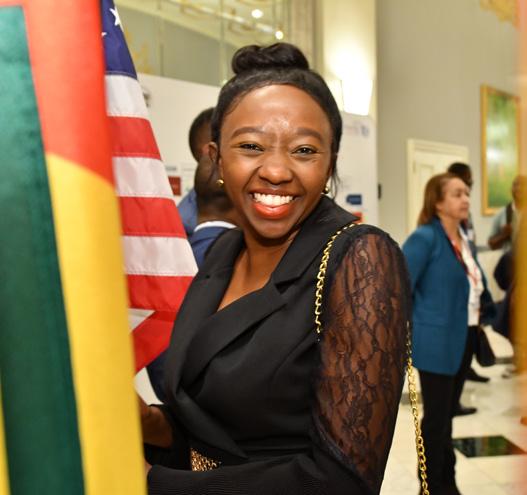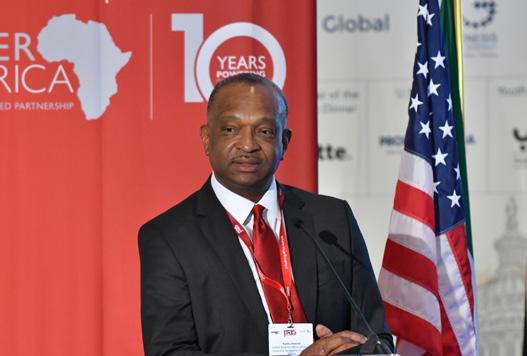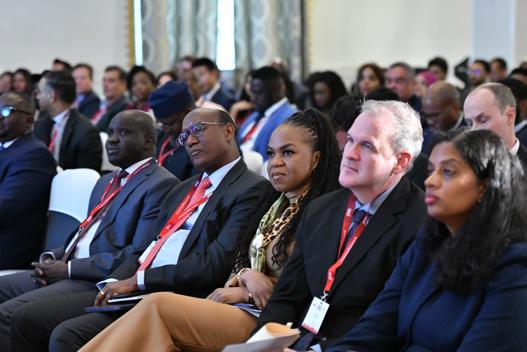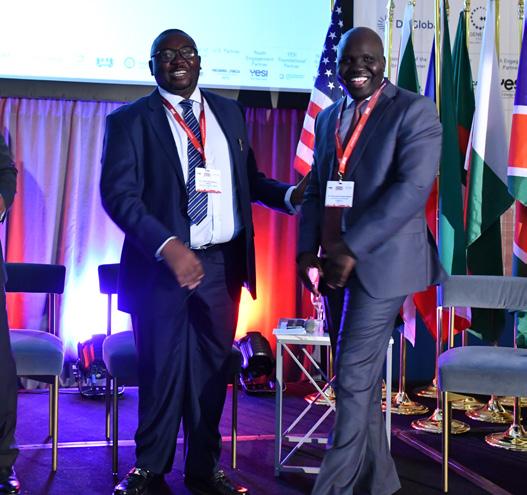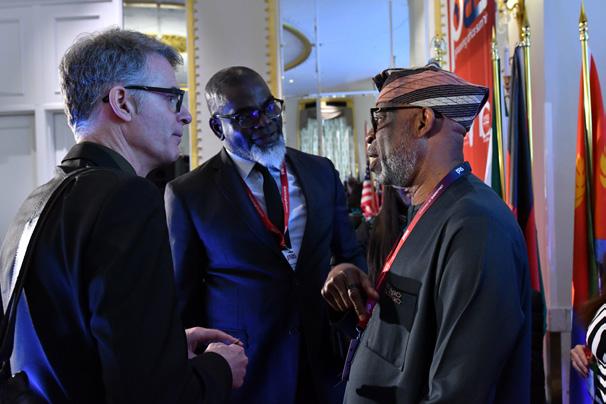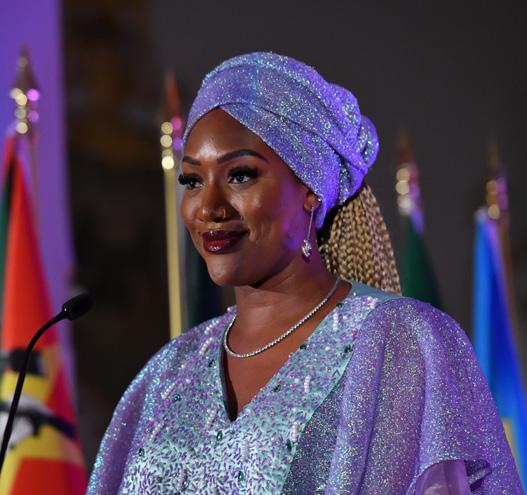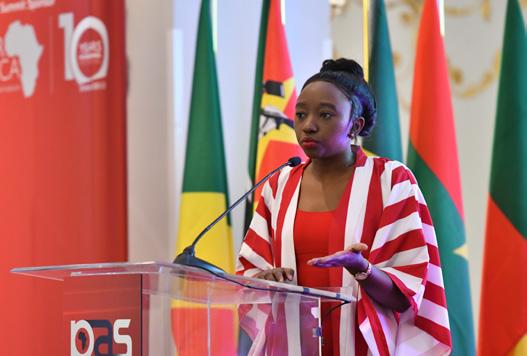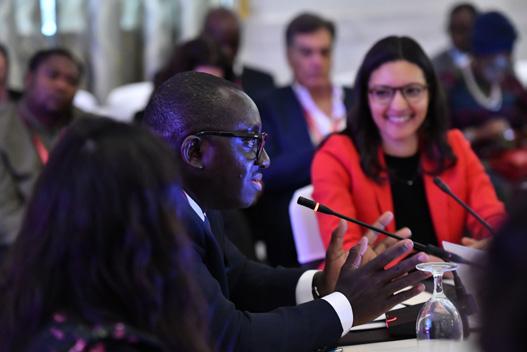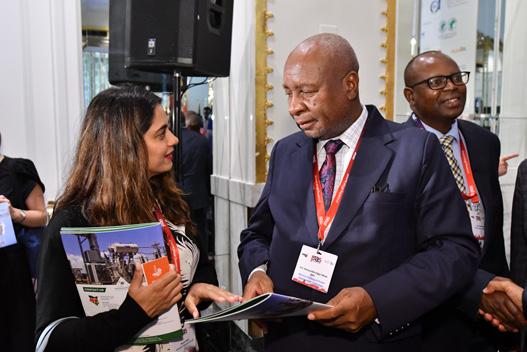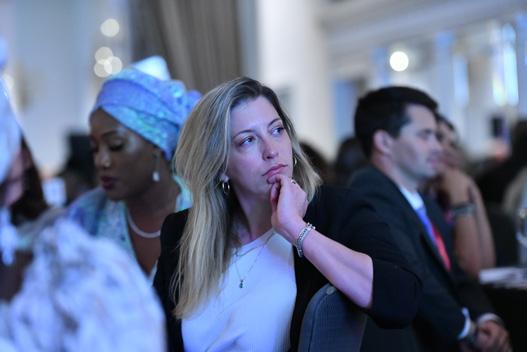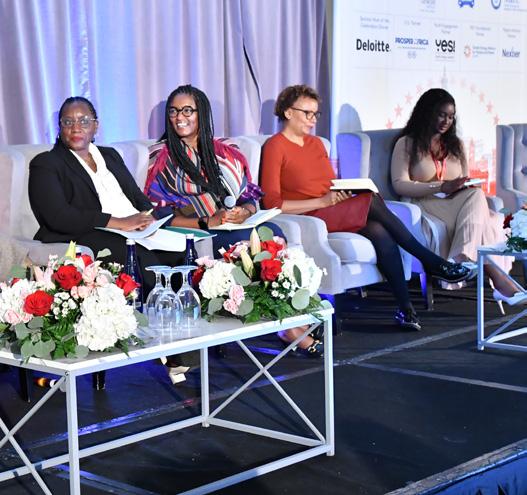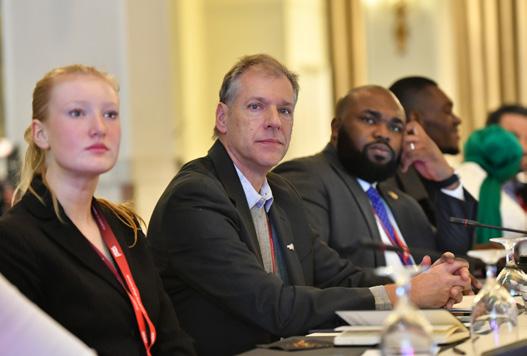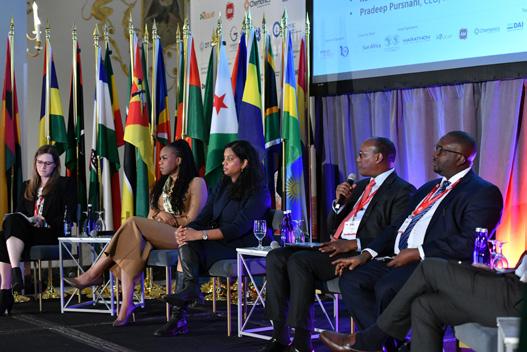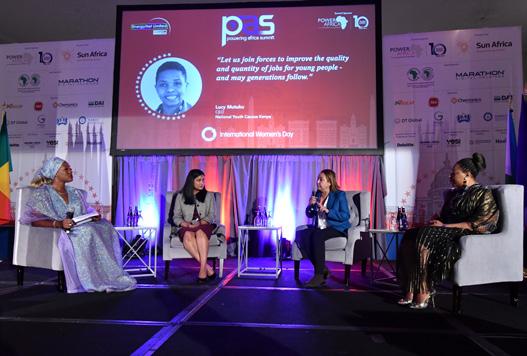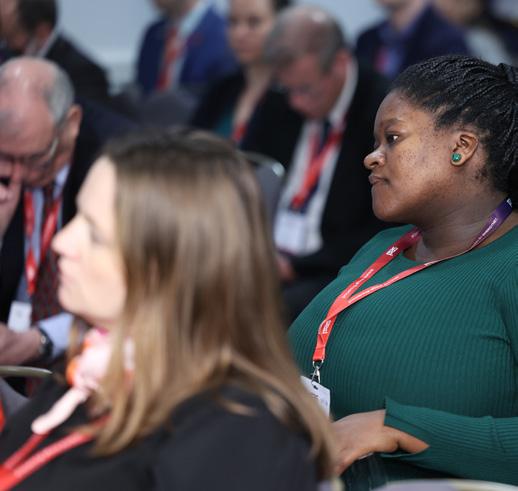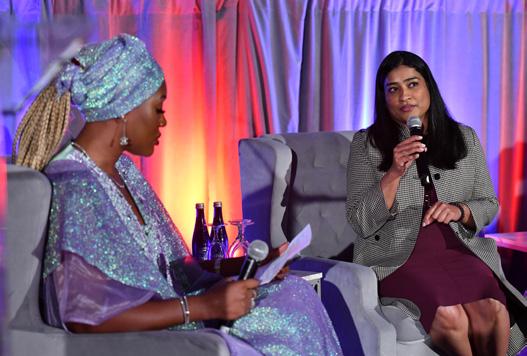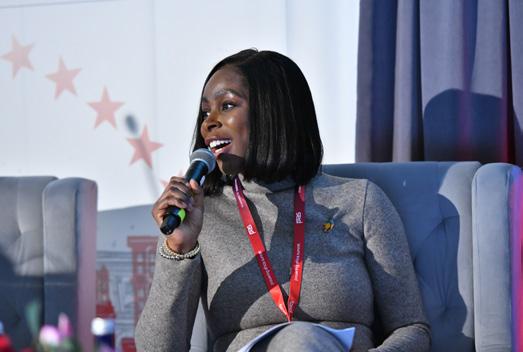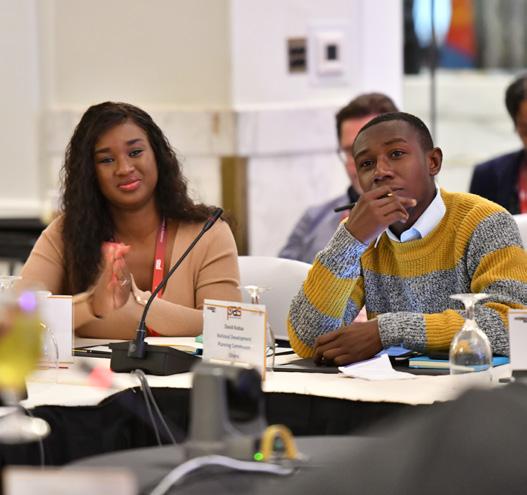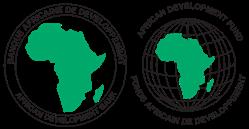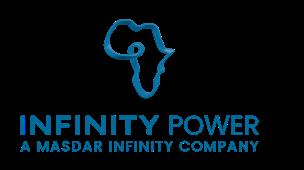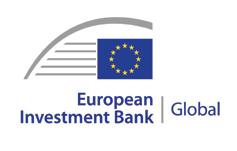

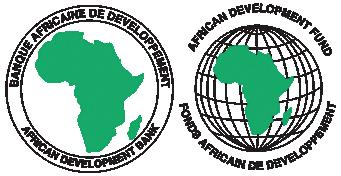






























Dear Colleagues,
We were thrilled to be back in Washington DC for the 9th edition of the Powering Africa Summit at the Mayflower Hotel, and to welcome Power Africa as the Summit Sponsor.
After two years, this was the opportunity to return with a vital, exciting, and interactive agenda focusing on capital flows, the energy transition, and how together we can increase the pace of projects across Africa.
Since the first summit in 2014, we have been truly grateful for the continued support from U.S. Government stakeholders, including institutional investors, private financiers, service and technology providers from North America, who come together with Ministers and governmental leaders at the highest level from across Africa to drive energy forward.
This year was no exception. I would like to express our thanks to Power Africa, Sun Africa, AfDB, Marathon Digital Holdings, and to all our sponsors and partners who supported the summit.
We were delighted to welcome H.E. Honourable Damilola Ogunbiyi (SEforALL, UN-Energy), USAID Administrator Samantha Power, Dr. Kevin Kariuki (AfDB) and The Honorable Judith Pryor (EXIM) who shared directional and inspiring remarks.
With International Women’s Day on 8 March, we held a Celebration Dinner hosted by Deloitte, under the theme “Celebrating Women at the Heart of Economic Development”. We were delighted to honour and celebrate our speakers, many of whom shared their own words of inspiration for others. With particular thanks to Lisa Witte, Acting Deputy Coordinator, Power Africa for opening remarks; and to Adaku Ufere, Chief of Party, USAID & Power Africa West Africa Energy Programme, Deloitte, who not only shared her thoughts in opening remarks, but also hosted the fireside chat at the dinner.
I would like to thank all our speakers and delegates for their time, frankness, and commitment – a commitment that will unite the sector to make change happen.
We have no doubt that the discussions, debate, and networking which took place over the two days of the summit will lead to positive change in the coming year and beyond.
 Gemma Gosling Producer EnergyNet
Gemma Gosling Producer EnergyNet

H.E. Honourable Adebayo Adelabu, Minister of Power, Nigeria
H.E. Honourable Dele Alake, Minister of Solid Minerals Development, Nigeria
H.E. Honourable Edgar Moyo (MP), Minister of Energy & Power Development, Zimbabwe
H.E. Honourable Ibrahim Matola, Minister of Energy, Malawi
His Royal Highness (HRH) Prince Lonkhokhela Dlamini, Minister of Natural Resources & Energy, Eswatini
H.E. Honourable Andrea Malueth, Deputy Secretary General (Infrastructure, Productive, Social & Political Sectors), East African Community Secretariat
H.E. Honourable Biodun Ogunleye, Commissioner, Energy & Mineral Resources, Lagos State Government, Nigeria
The Honorable Judith Pryor, First Vice President & Vice Chair, Export-Import Bank of the United States (EXIM)
H.E. Honourable Damilola Ogunbiyi, Special Representative of the United Nations Secretary-General, & CEO for Sustainable Energy for All (SEforALL), Co-Chair of UN-Energy
H.E. Chido Cleopatra Mpemba, AU Chairperson’s Special Envoy on Youth, Africa Union
Ambassador Chibamba Kanyama, Zambian Ambassador
Ambassador Marie-Helene Mathey Boo Lowumba, Democratic Republic of the Congo Ambassador
Lisa Witte, Acting Deputy Coordinator, Power Africa
Gina Cady, Health Electrification Advisor, Power Africa
Rockfeler Herisse, Senior Advisor, Climate Finance & Innovation, Power Africa
Kendra Gaither, President, U.S.-Africa Business Center, U.S. Chamber of Commerce
Scott Nathan, CEO, U.S. International Development Finance Corporation (DFC)
Beth Roberts, MD, Policy Africa & MENA, U.S. International Development Finance Corporation (DFC)
Abebe Selassie, Director, African Department, International Monetary Fund (IMF)
Helaina Matza, Acting Special Coordinator for the Partnership on Global Infrastructure Investment (PGI), U.S. Department of State
Danae Pauli, Senior Advisor, Partnership for Global Infrastructure and Investment (PGI), U.S. Department of State
Tarik Hamane, Acting CEO, Masen (Moroccan Agency for Sustainable Energy), Morocco
William Amuna, Technical Controller, Millennium Development Authority (MiDA), Ghana
Julie Cerqueira, Principal Deputy Assistant Secretary, Office of International Affairs, U.S. Department of Energy
Katerina Ntep, Deputy Vice President, Sector Operations, Millennium Challenge Corporation (MCC)
Alex Dixon, Senior Director, Blended Finance, Millennium Challenge Corporation (MCC)
Patrick Francis, Practice Lead, Senior Director, Environmental & Social Performance, Millennium Challenge Corporation (MCC)
Neb Girma, Practice Lead, Senior Director, Energy Practice Group, Millennium Challenge Corporation (MCC)
Michael Hamilton, Senior Director, Associate Practice Lead, Energy, Millennium Challenge Corporation (MCC)
Philippe Ossoucah, Deputy CEO, Gabon Power Company, Gabon
Gatluak Ruon Jal, Advisor to The Minister, Ministry of Water & Energy, Ethiopia
Laura Spector, Country Manager, Power Africa, U.S. Trade & Development Agency (USTDA)
Sebastian Keneally, Country Manager, Power Africa, U.S. Trade & Development Agency (USTDA)
Elsa Strydom, Head of Infrastructure Finance, IPP Office, South Africa
Yusuf Umar, Program Lead, NSIA Renewable Energy Platform, Nigerian Sovereign Investment Authority (NSIA), Nigeria
Obinna Ihedioha, Head of Strategy & Senior Advisor, Nigerian Sovereign Investment Authority (NSIA), Nigeria
Muhammad Modibbo, Senior Manager, Transaction & Commercial Advisory, Nigerian Bulk Electricity Trading (NBET), Nigeria
Stephen Mallowah, Member of the PPP Committee, Public Private Partnership Directorate, Ministry of Treasury & Planning, Kenya

Julius Ogamba, Chairman, KenGen (Kenya Electricity Generating Company), Kenya
Benson Uwheru, MD/CEO, Port Harcourt Electricity Distribution Company (PHED), Nigeria
Marcelino Alberto, Chairman & CEO, Electricidade de Moçambique (EDM), Mozambique
António Munguambe, System Planning & Engineering Director, Electricidade de Moçambique (EDM), Mozambique
Ebenezer Essienyi, Chief Executive, GRIDCo, Ghana
Chiedu Ugbo, MD/CEO, Niger Delta Power Holding Company (NDPHC), Nigeria
Ernest Mkhonta, MD, Eswatini Electricity Company (EEC), Eswatini
Mphumuzi Maziya, GM Research & Development, Eswatini Electricity Company (EEC), Eswatini
Seluleko Fakudze, Generation Mechanical Engineer. Eswatini Electricity Company (EEC), Eswatini
Vickson N’cube, Board Chairperson, ZESCO, Zambia
Cletus Nyachowe, International Business Consultant, ZESA Holdings, Zimbabwe
Assefa Negussie Ambaw, Executive Officer, Generation Construction, Ethiopian Electric Power (EEP), Ethiopia
Mebratu Lemma, Project Manager of Koysha Hydro Power Project & Deputy Project Manager of Gibe III Hydroelectric Project, Ethiopian Electric Power (EEP), Ethiopia
Geoffrey Mabea, Executive Secretary, Energy Regulators Association of East Africa (EREA)
Abdellatif Bardach, President, Autorité Nationale de Régulation de l’électricité (ANRE), Morocco
Sandrine Ngalula Mubenga, CEO, Autorite de Regulation du secteur de l’Electricite (ARE), Democratic Republic of the Congo
Skhumbuzo Tsabedze, CEO, Eswatini Energy Regulatory Authority (ESERA), Eswatini
Leonilde Santos, President, Agencia Reguladora Multissectorial da Economia (ARME), Cape Verde
Carlos Ramos, Director, Agencia Reguladora Multissectorial da Economia (ARME), Cape Verde
Hisham Choueiki, Principal Technical Advisor, International Programs, National Association of Regulatory Utility Commissioners (NARUC)
Etem Erten, Technical Advisor, International Programs, National Association of Regulatory Utility Commissioners (NARUC)
Adam Cortese, CEO, Sun Africa
Andrew Herscowitz, Executive Director, ODI Global Akinwole Omoboriowo II, Chairman & CEO, Genesis Energy
Kevin Kariuki, Vice President, Power, Energy, Climate Change & Green Growth, AfDB
Daniel Schroth, Director for Renewable Energy, AfDB
Batchi Baldeh, Director for Power Systems Development, AfDB
Callixte Kambanda, Division Manager, Energy Policy, Regulations & Statistics, AfDB
Angela Nalikka, Manager, Power Systems Solutions, AfDB
Abdul Malik, Global Lead, Work & Enterprise, Aga Khan Foundation
Junaid Ahmad, Vice President & Chief Operating Officer, MIGA, The World Bank Group
Marcus Williams, Global Head, Energy & Extractive Industries, MIGA, The World Bank Group
Suman Sureshbabu, MD for Demand, Jobs & Livelihoods, Global Energy Alliance for People and Planet (GEAPP)
Bruce Anderson, CEO, 247Solar
Chantelle Abdul, Group MD/CEO, Mojec International

Bhavtik Vallabhjee, Head: Power & Renewables, Absa Bank
Andreas Cremer, Department Head, Infrastructure & Energy, Africa/Latin America, DEG
Anita Otubu, Senior Director, Universal Energy Facility (UEF), Sustainable Energy for All (SEforALL)
Barnaby Fletcher, Director, Control Risks
Chinua Azubike, CEO, InfraCredit
Erik Granskog, Founder & CEO, Milele Energy
Jay Ireland, Executive Chairman, Milele Energy & Board Member, Mastercard Foundation
Rachel Moré-Oshodi, CEO, ARM-Harith Infrastructure Investment
Jayson Browder, Vice President of Policy, Marathon Digital Holdings
Adam Swick, Chief Growth Officer, Marathon Digital Holdings
Raymond Walintukan, SVP of Mining Operations, Marathon Digital Holdings
Wyatt Shely, Director of Special Projects, Marathon Digital Holdings
Eric Reading, Chief Climate Officer, Abt Global
Shelley Martin, Senior Manager, Gender Equity, Disability & Social Inclusion, Abt Global
Isaac Ogu, Group Head: Project Finance & Infrastructure, Wema Bank, Nigeria
Abiodun Aina, Senior Investment Officer, International Finance Corporation (IFC)
Raul Alfaro Pelico, Senior Advisor, Results-Based Financing, Sustainable Energy for All (SEforALL)
Lamyaa Youssef, Independent Consultant, Egypt
Tshepidi Moremong, Chief Operating Officer, Africa50
Lawrence Jones, Senior Vice President, International Programs, Edison Electric Institute
Grant McCarty, Co-Executive Director, Bitcoin Policy Institute
Ewelina Czapla, Director of Energy Policy, Chamber of Digital Commerce
Frannie Léautier, Senior Partner & CEO, SouthBridge Investment & Director, Global Energy Alliance for People and Planet (GEAPP)
Kate Steel, Co-Founder & CEO, Nithio
Melissa Persaud, Vice President, Fraym
Celina Lee, Co-Founder & CEO, Zindi
Aline Varre, Director of Strategy & Business Development, The Foundation for Partnership Initiatives in the Niger Delta (PIND Foundation)
Arshad Mansoor, CEO, EPRI
Kurt Reuman, Power Sector Transaction Advisor, West Africa Energy Program, Deloitte
Emeka Okpukpara, Partner, Nextier
Sebastian Deschler, General Counsel, CrossBoundary
Mathieu Brun, Head of Grant Funding, Finance Department, ENGIE Energy Access
Asha Varghese, Head of Corporate Social Responsibility, Caterpillar Inc.
Richard Schroeder, Director, RESOLVE
Pradeep Pursnani, CEO, Konexa
Nicole Poindexter, CEO & Founder, Energicity
Alba Topulli, Deputy MD, Mercy Corps - Energy 4 Impact
Nnadozie Ifeanyi-Nwaoha, Managing Consultant, Energy Market and Rates Consultants (EMRC)
Carolina Lasso Navarro, Counsellor for Development Affairs & International Partnerships, European Union
Osaruyi Orobosa-Ogbeide, Senior Vice President, Project Development, Africa Finance Corporation
Magase Mogale, Executive Vice President, Africell

Ademola Ogunbanjo, Executive Vice President, Oando Clean Energy
Subha Nagarajan, MD, Financial Services, Capital Markets, GE Vernova
Luke Webster, Fundraising & Partnerships Manager, YES!
Andrew Herscowitz, Executive Director, ODI Global
Mohamed Badissy, Affiliate Faculty, Penn State Dickinson School of Law & Senior Advisor for Energy & Finance, Commercial Law Development Program, U.S. Department of Commerce
Kweku Awotwi, Board Chairman, United Bank for Africa (Ghana) & Co-Founder & Director, Cenpower Generation Company, Ghana
Vuyo Ntoi, Joint Managing Director, African Infrastructure Investment Managers (AIIM)
Haruperi Mumbengegwi, Counsel, MIGA, The World Bank Group
Rogness Swai, Energy Programs Advisor, USAID
Emily McAteer, CEO, Odyssey Energy Solutions
Jay Ireland, Executive Chairman, Milele Energy & Board Member, Mastercard Foundation
Guevera Yao, Executive Director, U.S.-Africa Business Center, U.S. Chamber of Commerce
Ellasandra Walsh, Associate Manager & Sustainability Lead, U.S.-Africa Business Center, U.S. Chamber of Commerce
Jason Ray Hutchison, Senior Director, Clean Energy & Climate Mitigation, Global Development Group, Abt Global
Arun Asok, Global Head, Private Capital & Impact Investing, Abt Global
Georgia Iordanescu, Senior Lead Specialist, Clean Energy, DAI
Amer Barghouth, Technical Director of Energy Services, DT Global
Matthew Mendis, MD, Energy, Chemonics
Leria Arinaitwe, Legal Counsel & Energy Sector Lead, African Legal Support Facility (ALSF)
Benedetta Audia, Principal, International Development LLC
Charlene Ruto, Youth Champion & Climate Action Champion, Kenya
Daniel Aryee, Policy and Programs Specialist, Office of the African Union Youth Envoy, African Union Commission
Amal Nasr Hussien Mohamed, HV/MV Substation Electrical Engineer, Egyptian Electricity Transmission Company (EETC), Egypt
David Kodua, Graduate Assistant, National Development Planning Commission, Ghana
Noella Molefe, Senior Specialist, Climate Change & Air Quality, Exxaro Resources, South Africa
Daniel Tate, Rhodes Scholar & DPhil (PhD) Candidate, International Relations, University of Oxford
Soufiane Hachad, Head of Energy Demand Studies Unit, Directorate of Strategy & Planning, Office National de l’Electricité et de l’Eau Potable (ONEE), Morocco
Malik Bargach, Specialist, Cooperation & International Development, Masen (Moroccan Agency for Sustainable Energy), Morocco
Natalie Agina, Branding & Visibility Lead, SMACHS Foundation, Kenya
Peper Granskog, Youth Energy Ambassador/YOUNGO
David Arinze, Program Officer, Off Grid Energy, Diamond Development Initiatives (DDI)
Aminata Diop Samb, Director General, FODEM (Fonds de Développement et de Solidarité Municipal), Senegal
Dan Kammen, Professor of Energy, University of California, Berkeley

38 countries represented
Top 5: USA, Nigeria, Kenya, UK, South Africa
Africa: Cape Verde, Congo, Côte d’Ivoire, Egypt, Eswatini, Ethiopia, Gabon, Ghana, Malawi, Mauritius, Morocco, Mozambique, Rwanda, Senegal, Sierra Leone, Somalia, Tanzania, Uganda, Zambia, Zimbabwe
Rest of world: Austria, Bahrain, Canada, France, Germany, Ireland, Netherlands, Portugal, Saudi Arabia, Switzerland, United Arab Emirates
Networking App Highlights







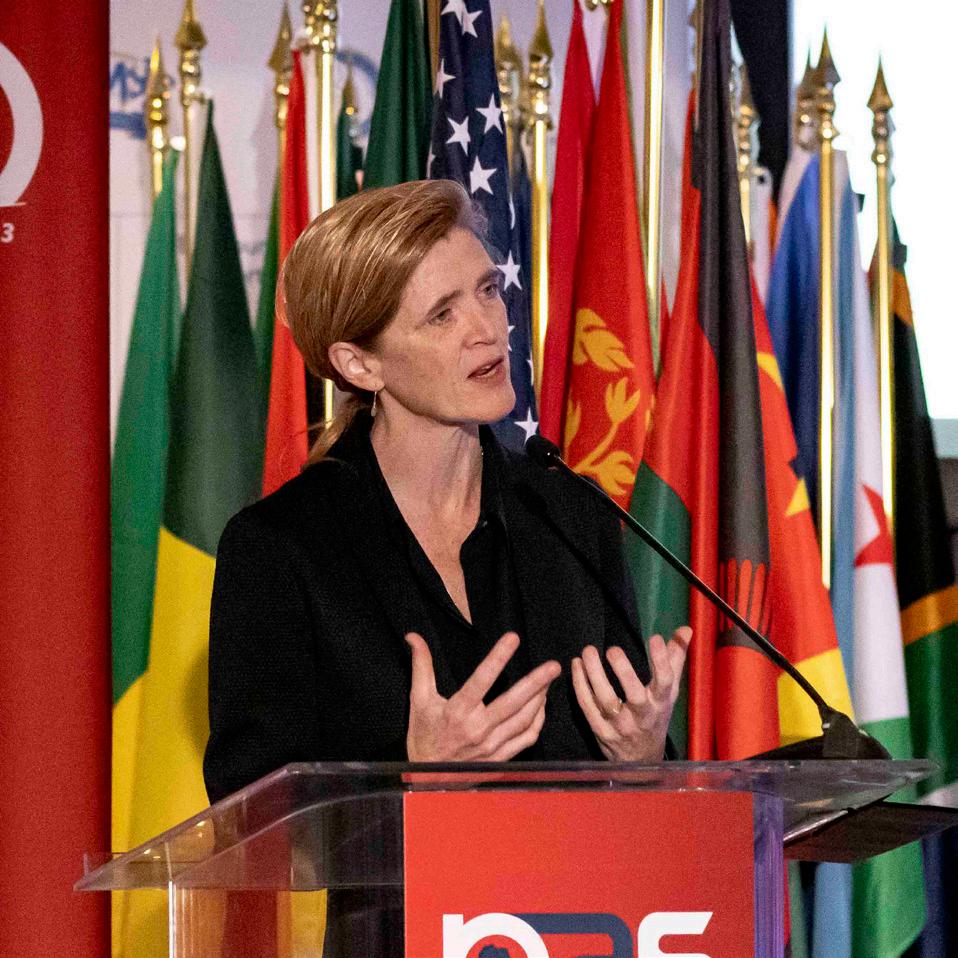
USAID Administrator Samantha Power addressed energy ministers from across ub-Saharan Africa
Administrator Samantha Power welcomed energy ministers and delivered the opening remarks during the Power Africa opening session ‘Accelerating Energy Access: What Will it Take to Accelerate (Just) Energy Access Over the Next 10 Years?’ to reinforce the United States’ longstanding and continued commitment to the African continent.
Under the theme ‘Capital Flows Underpinning the Energy Transition’, the Administrator addressed the United States’ partnership and commitment over the next ten years and reflected on the successful programs started by Power Africa and its private, development, and interagency partners.
Dr Kevin Kariuki postulated that energy transition will be anchored on the continent’s vast renewable energy sources as well as increasing regional interconnections. With natural gas remaining an important transition fuel, providing flexible generation, and enabling a greater uptake of solar and wind generation, he highlighted the need to accelerate the development of cost-effective green hydrogen and cost competitive energy storage systems.
The Honorable Judith Pryor expressed her pride in Exim’s enduring commitment to the African region, mentioning the recent $900 million in financing for solar projects in Angola. With the urgent opportunity to catalyse the private sector, she reaffirmed Exim as a steadfast partner to the continent, in a journey of partnership and collaboration.
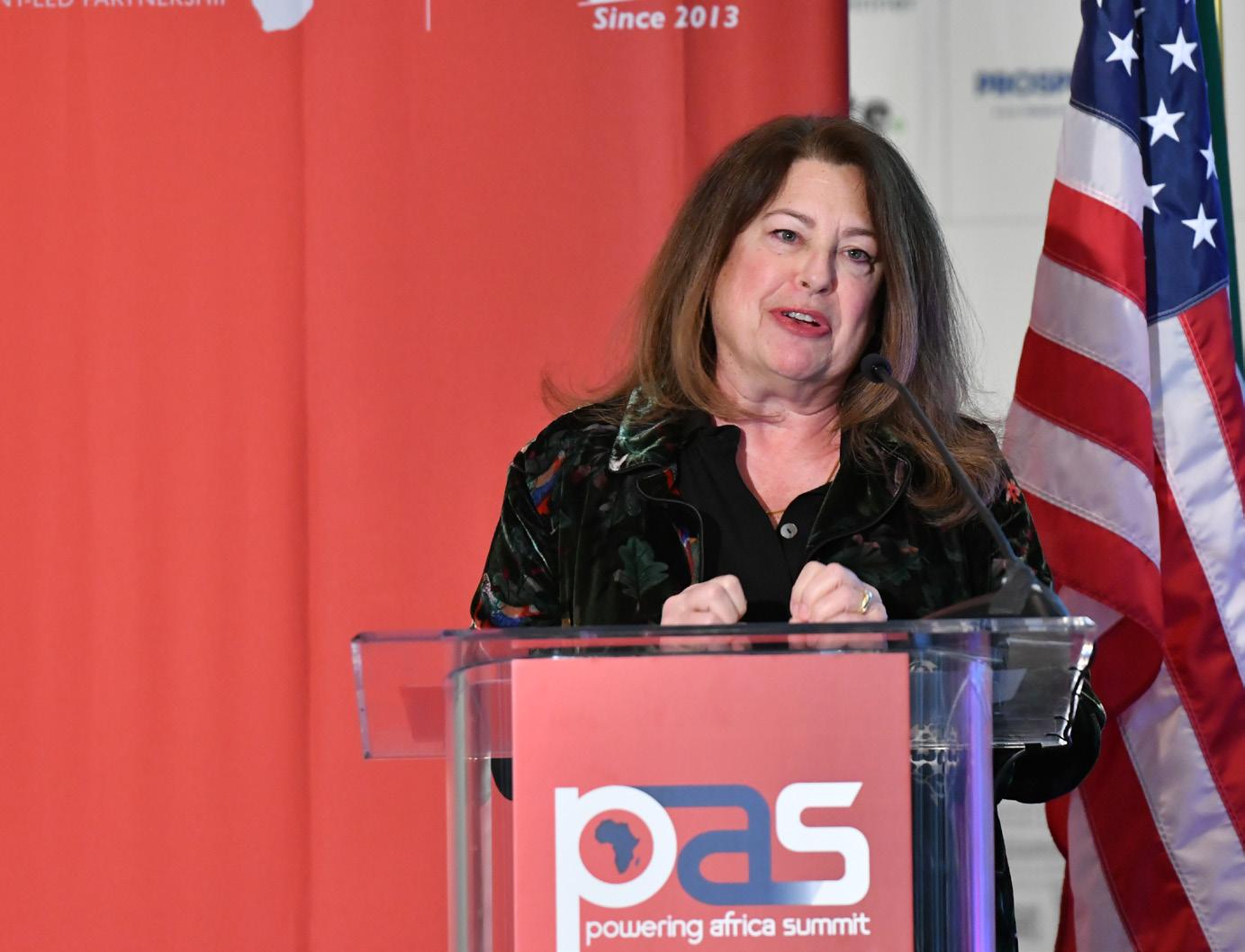
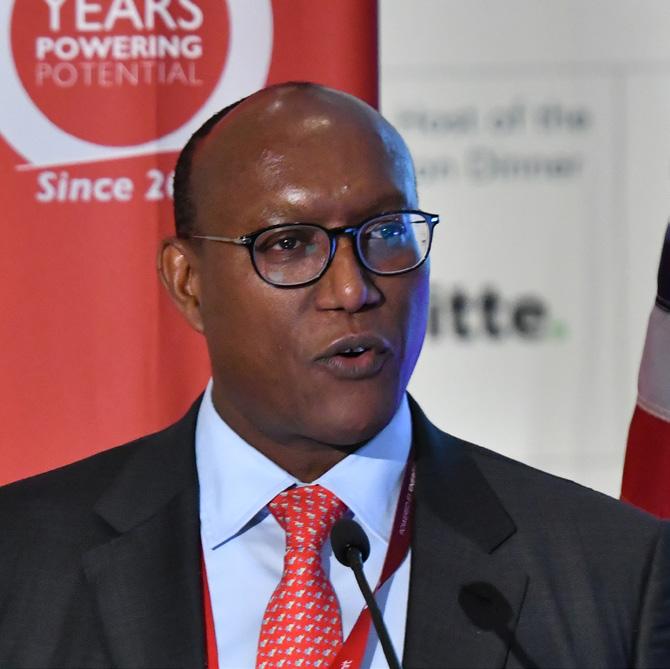

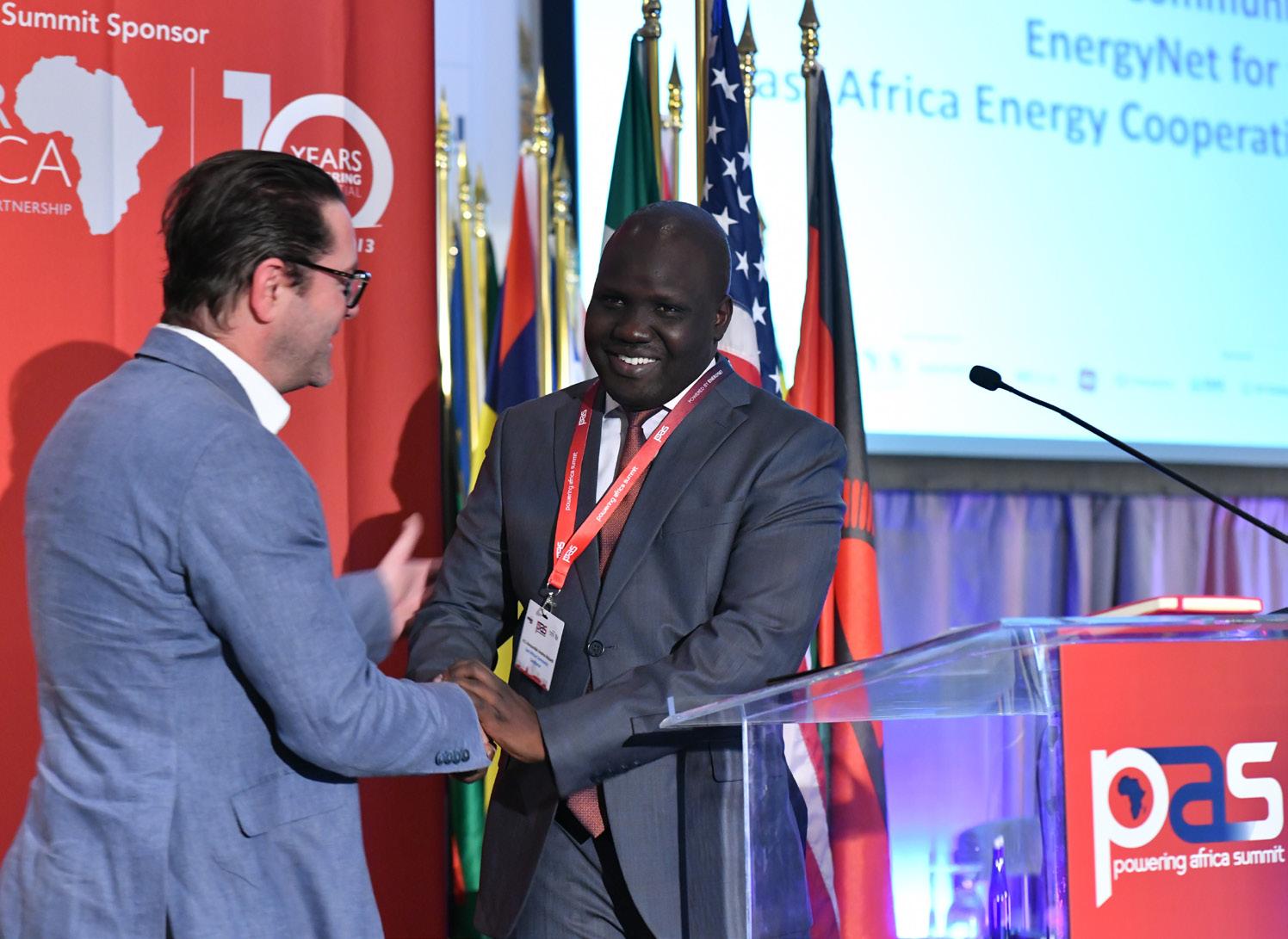
In an agreement signed and announced in Washington, the EAC has partnered with EnergyNet to help fulfil its pledge to bolster East Africa’s energy sector and enhance collaboration between its countries. The partnership was announced alongside the rebranding of the Tanzania Energy Cooperation Summit (TECS) into a broader, regional investors summit from 2025 – The East Africa Energy Cooperation Summit (EA-ECS).
“This partnership demonstrates our commitment to shaping a prosperous, competitive, secure, stable and politically united commented H.E. Honourable Andrea Malueth, Deputy Secretary General (Infrastructure, Productive, Social & Political Sectors), East African Community Secretariat.
“Energy is a pillar for development and growth and is crucial for the functioning of the economies of the EAC Partner States. The East Africa Energy Cooperation Summit will serve as the ideal platform for advancing projects and bringing tangible changes in
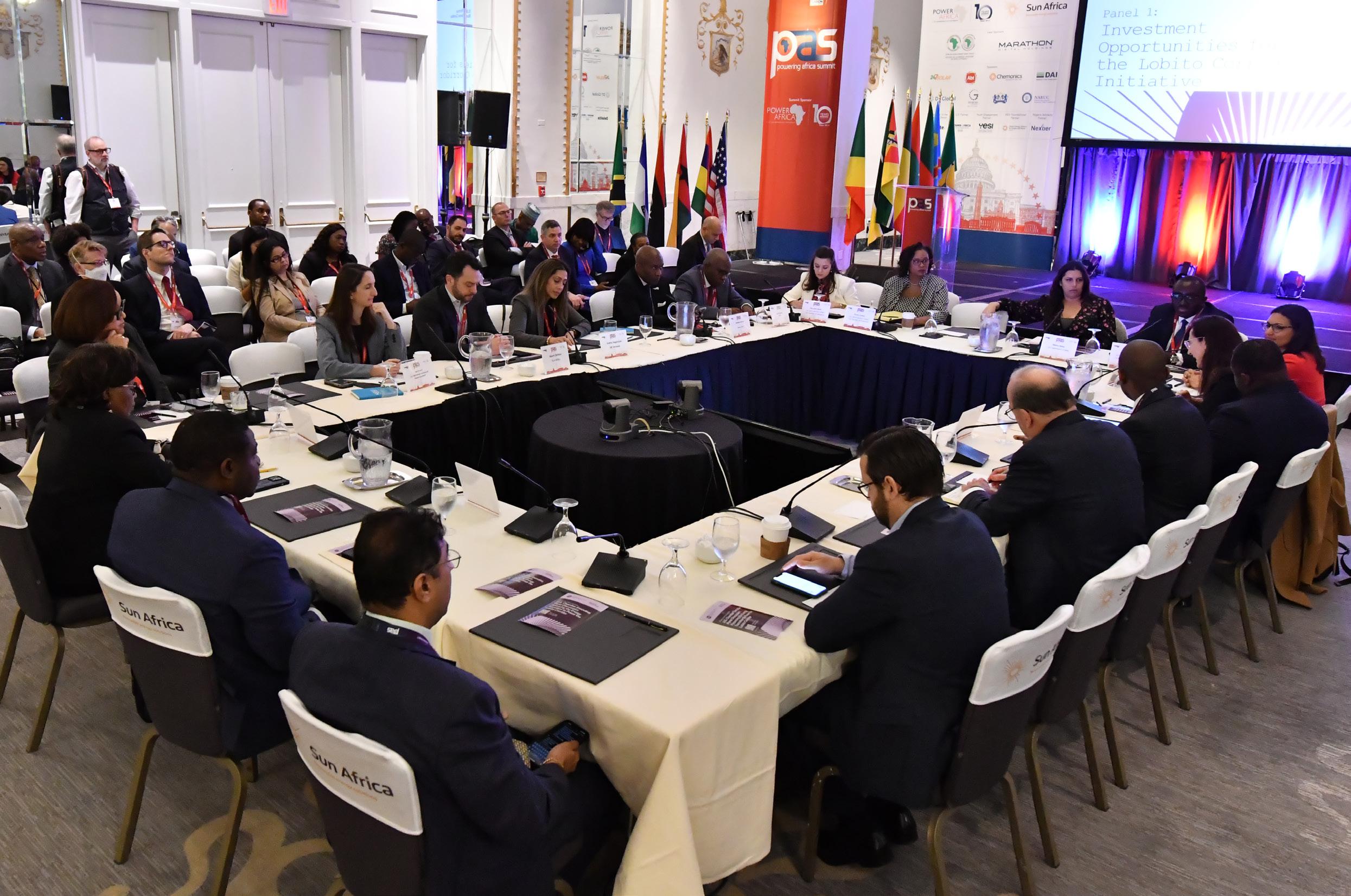
Day One: Tuesday 5 March 2024
Signing of the Partnership Between the East African Community (EAC) & EnergyNet for the East Africa Energy Cooperation Summit 2025
Welcome to PAS 2024
EnergyNet
Sun Africa
Power Africa: Accelerating Energy Access: What Will it Take to Accelerate (Just) Energy Access Over the Next 10 Years?
Opening Remarks: African Development Bank (AfDB)
Opening Remarks: Export-Import Bank of the United States (EXIM)
Ministerial Roundtable: What Would Be the Impact of Lowering the Cost of Debt & Alternative Solutions to Sovereign Guarantees?
Boardroom: Lowering the Cost of Debt & Solving the Sovereign Guarantee Impasse
Closed-Door Utilities Roundtable: By Invitation Only - Halting the Exodus of Large-Scale Investors
Celebration Dinner – Celebrating Women at the Heart of Economic Development
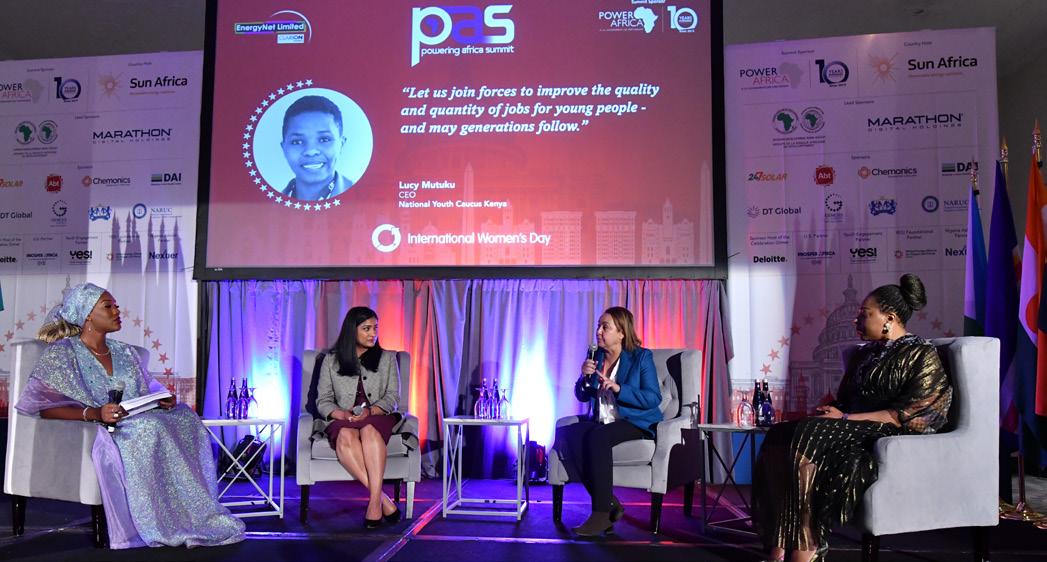

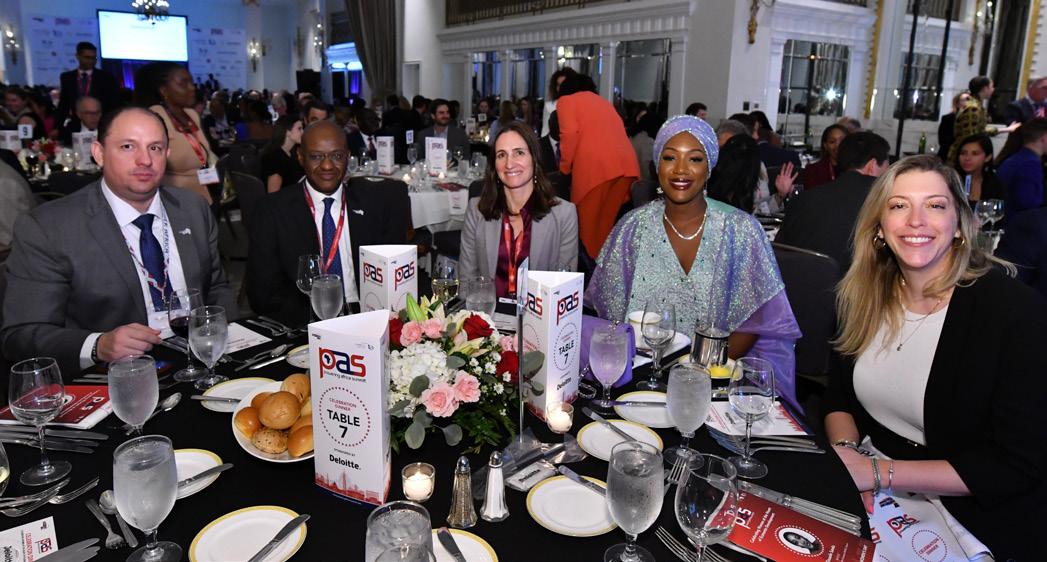
Powering Africa Summit serves as a pivotal platform for Power Africa and Prosper Africa’s Clean Tech Energy Network, as it brings together key stakeholders dedicated to advancing clean energy initiatives across the continent. We are committed to leveraging this platform to strengthen private company participation in the clean tech energy sector. To facilitate this, we provide a space in a private meeting room for meaningful dialogues to unfold between African delegations, US Government Agencies, and private U.S. clean tech companies.

Breakfast Roundtable Hosted by YES! (Youth Energy Summit): Scaling Up Job Creation and Employment on the Continent
Breakfast Briefing Hosted by DT Global: Nigeria: Fulfilling the Promise of the Electricity Act 2023
Hosted by the U.S. Chamber of Commerce: Executive Panel Discussion: Financing the Energy Transition to Power the Lobito Corridor
Hosted by Power Africa: Women are Leading Africa’s Just Energy Transition
Hosted by Masen: Driving the Change from the Inside - Morocco-Ethiopia Coalition for Sustainable Energy Access (CSEA)
Africa Climate Summit (ACS) and COP28 – Will Africa’s Energy Sector Finally Realise the New Climate Finance Promised?
Hosted by Marathon Digital Holdings: Energizing Africa: Bitcoin Mining as a Technology Solution for Africa’s Energy Infrastructure
Hosted by DAI Global: Can Data Transform Financing for the Sustainable Energy Transition?
Closed-Door Regulators Roundtable: By Invitation Only - Regulating the Carbon Markets
The Future for IPPs – What is Required to Hasten the Pace of IPPs Across the Continent?
Hosted by African Development Bank (AfDB): Unravelling Africa’s Energy Transition
Hosted by Chemonics: Legal, Institutional, Financial and Infrastructure Hurdles for Large-Scale, GridConnected Renewable Energy Projects in Sub-Saharan Africa
Transmission - Unleashing Africa’s Energy Potential
Powering Industrial Growth: Addressing Africa’s Energy Needs to Fuel Industrial Development
Hosted by Abt Global: Bridging the Finance Gap for Social Infrastructure
DAI is delighted to sponsor the 2024 Powering Africa Summit. We are committed to shaping a more livable world and understanding the transformative power of accessible and sustainable energy. We welcome the opportunity this Summit presents to discuss with regional and global energy leaders and investors how to unlock Africa’s energy potential.
Sarah Helmstadter Senior Vice President, U.S. Government Business, DAI Global
Roundtable:
Chairperson:
Kweku Awotwi, Board Chairman, United Bank for Africa (Ghana) & Co-Founder & Director, Cenpower Generation Company, Ghana
US to Africa Investment - Opening Remarks: Scott Nathan, CEO, U.S. International Development Finance Corporation (DFC)
UN High-Level Remarks:
H.E. Honourable Damilola Ogunbiyi, Special Representative of the United Nations SecretaryGeneral, & CEO for Sustainable Energy for All (SEforALL), Co-Chair of UN-Energy
High-Level Scene Setting Presentation: Abebe Selassie, Director, African Department, International Monetary Fund (IMF)
Key Participants:
• H.E. Honourable Adebayo Adelabu, Minister of Power, Nigeria
• H.E. Honourable Dr. Dele Alake, Minister of Solid Minerals Development, Nigeria
• H.E. Honourable Edgar Moyo (MP), Minister of Energy & Power Development, Zimbabwe
• H.E. Honourable Ibrahim Matola, Minister of Energy, Malawi
• H.E. Honourable Andrea Malueth, Deputy Secretary General (Infrastructure, Productive, Social & Political Sectors), East African Community Secretariat
AU Youth Remarks - The Role of Youth to Deliver the Goals of Todays Ministers: H.E. Chido Cleopatra Mpemba, AU Chairperson’s Special Envoy on Youth, Africa Union
Special Closing Remarks: How the Investment Climate Will Attract Major Private Sector Investors
Kendra Gaither, President, U.S.-Africa Business Center, U.S. Chamber of Commerce
Over the past 10 years, there has been a significant shift in the creditor landscape. The landscape has changed from large multinational creditors to smaller private and bilateral creditors. This has afforded the Continent greater access to capital markets, but that access has been accompanied by an increase in the cost of debt and shorter debt terms. Over the past 10 years, the average debt ratio of a sub-Saharan African country has doubled which has resulted in a riskier lending profile. To address these challenges there needs to be a shift from direct lending to the use of catalytic instruments. There also must be a move away from sovereign guarantees and an embrace of other methods to de-risk transactions. Finally, the risk analytics for sub-Saharan Africa must also adjust to the reality of the Continent and the fiscal climate risk.
The reality of sub-Saharan Africa is that there is a big funding squeeze, and the continent is at an inflection point in terms of debt burdens. However, moving forward Africa poses massive opportunities for investment and growth from its natural resources to the labor market. By 2030, one in two new entrants into the new labor force will be from sub-Saharan African countries, so it would be unwise to stop investing in the Continent. Sub-Saharan African countries have three main sources of development finance: tax revenues, borrowing, and concessional finance. While the concessional finance space has been disheartening and aid flows have been cut, that does not mean that you can forget the other two sources. There needs to be an increase in investment in tax revenues to account for the rate of return on infrastructure investments through the tax system.
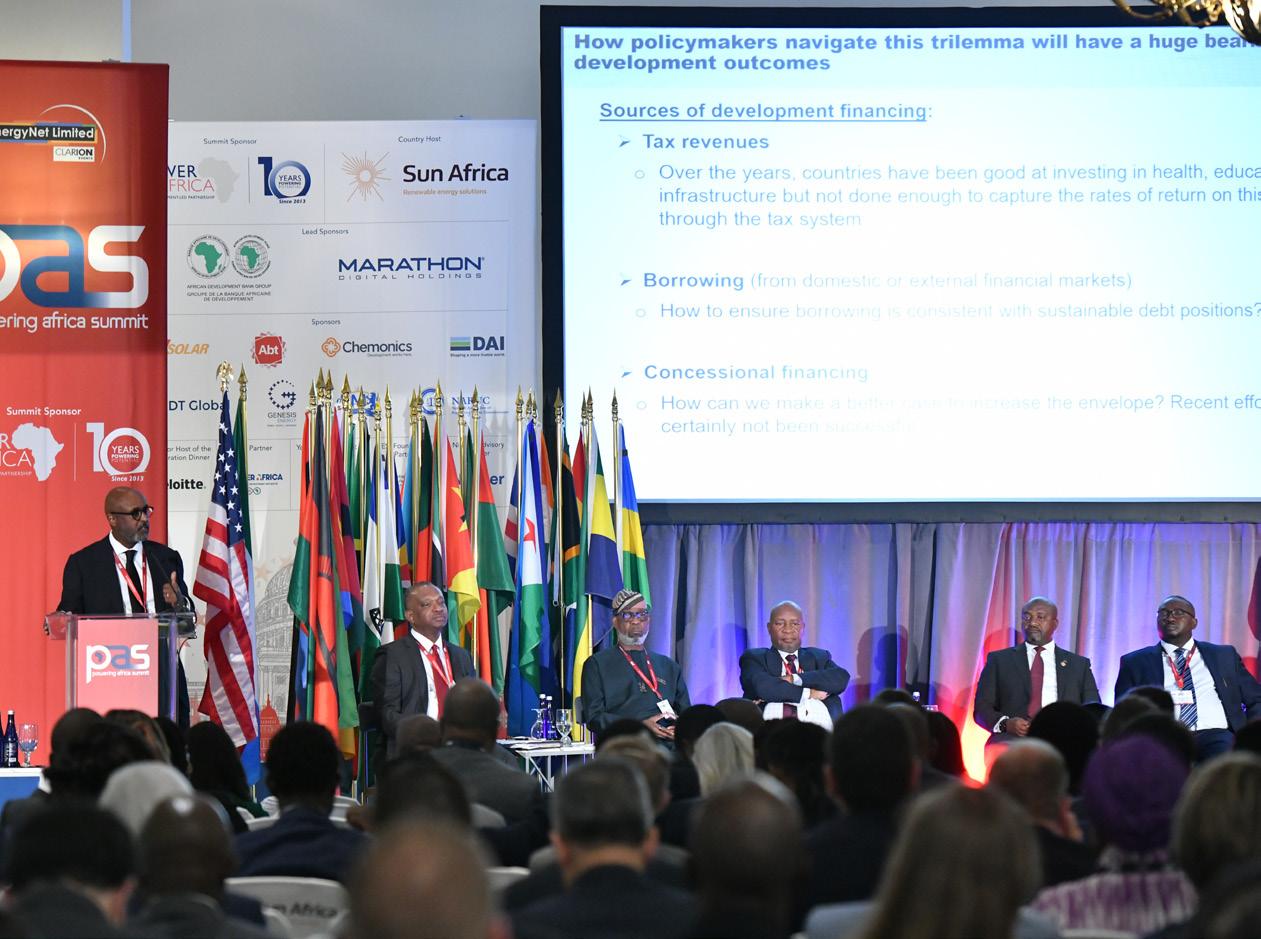

Ministerial Roundtable continued

There needs to be an increase in investment across the Continent and the power sector to facilitate the development of industrial processes. However, all development ties back to investment and development of the power sector as there can be no processing or production without power. To facilitate this development, there needs to be programs to address repayment risk that arises because of the exchange risk facing projects financing in U.S. dollars. To account for this risk there must also be a movement towards cost-reflective tariffs. Governments cannot continue to guarantee projects that are not priced to be commercially viable.
To see gains across the Continent there must be a regional approach and regional investments. This must be led by African leaders and with African investment. There must also be investment in education and infrastructure to support the development of countries along with the development of energy systems.
Lastly, mining can be a source of financing and the firm off-taker needed to facilitate the development of the energy system. For decades, Africa has provided minerals to the world without seeing real gains at home. To see these gains there must be processing and production brought back to the continent. African infrastructure and mining projects have been to the benefit of creditor nations, and it is time that African governments stop carrying these loans and debts to meet creditor interests. There must be a promotion of local value generation on the continent, not just value exportation. Further, to accomplish these results sovereign guarantees are not effective. Instead, PPP frameworks must be strengthened to protect African government’s interests and to facilitate access to private capital.
Author: Elizabeth Clinch, Penn State University

Breakfast Roundtable: Hosted by YES! (Youth

Chairperson: Mohamed Badissy - Affiliate Faculty, Penn State Dickinson School of Law & Senior Advisor for Energy & Finance, Commercial Law Development Program, U.S. Department of Commerce
Scene Setting Presentation: Luke Webster, Fundraising & Partnerships Manager, YES!
YES! Member Youth Perspective on Energy: Charlene Ruto, Youth Champion & Climate Action Champion, Kenya
Foundations, Philanthropy & Initiative Providers:
• Lisa Witte, Acting Deputy Coordinator, Power Africa
• Jay Ireland, Executive Chairman, Milele Energy & Board Member, Mastercard Foundation
• Dan Kammen, Professor of Energy, University of California, Berkeley
• Andrew Herscowitz, Executive Director, ODI Global
• Aline Varre, Director of Strategy & Business Development, The Foundation for Partnership Initiatives in the Niger Delta (PIND Foundation)
• Abdul Malik, Global Lead, Work & Enterprise, Aga Khan Foundation
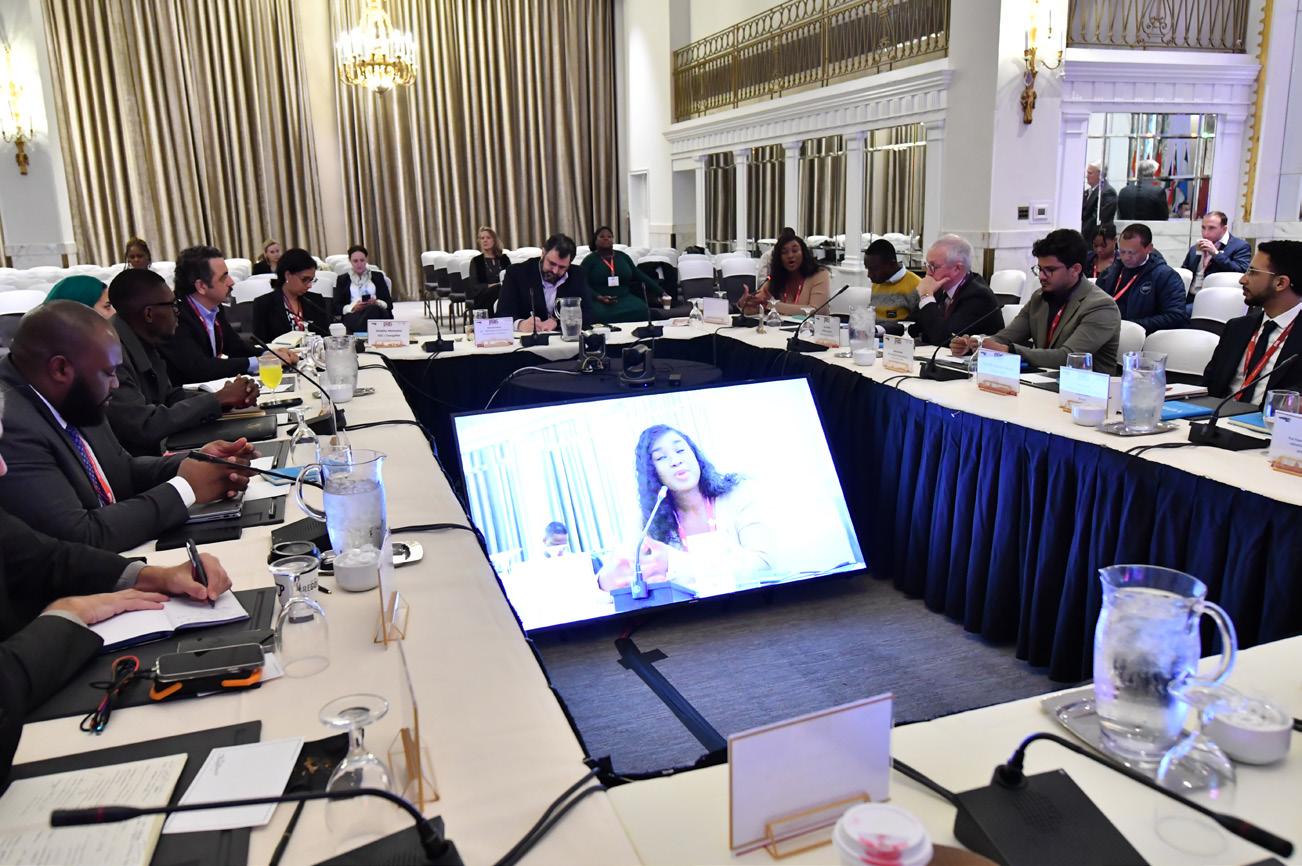
Empowering Africa’s youth in the energy sector is crucial to unlock the continent’s potential and accelerate clean energy access. The roundtable brought together a diverse panel of experts, activists, and youth leaders to discuss strategies for scaling up job creation and employment opportunities for young Africans in the energy sector.
Young people play a critical role in addressing Africa’s energy challenges, including access to clean energy and the transition to renewable sources. Youthled initiatives demonstrate the potential of young Africans to drive climate action and sustainable energy practices.
However, unlocking this potential requires addressing several key challenges. First, there’s a significant gap between the abundant talent among Africa’s youth and the opportunities available in the energy sector. Despite the pledge of millions
Advancing on our relentless journey of “Lighting up Africa, One Community at a Time” Genesis Energy Group continues to champion sustainable energy solutions, investing in resilient agriculture initiatives, and igniting hope in communities across Africa for nearly two decades. This year we proudly join hands as partners and sponsors of the Power Africa Summit - an invaluable platform to ignite transformative dialogue with Governments, Financiers, Developers and Private Players to catalyse the global drive to a sustainable future!
Akinwole Omoboriowo II Chairman & CEO, Genesis Energy Group
in capital for energy projects, connecting young talent with these opportunities remains a persistent issue. Networking and the establishment of platforms for collaboration were emphasized as powerful tools to bridge this gap.
The session also highlighted the critical need for mentorship, guidance, technical resources, and financial support to nurture young talent in the energy sector. The YES! mission to build a network of 100 million people by 2035, focusing on job creation, grassroots participation and knowledge sharing in the energy sector is a great example of initiatives to build the capacity of young people. This ambitious goal is supported by YES! foundational partner the Global Energy Alliance for People and Planet (GEAPP), which aims to create a hundred million green jobs by 2030.
To achieve these objectives, participants called for innovative approaches to education, training, and entrepreneurship. Programs that move from wood to clean cooking solutions in Kenya, Tanzania, and Rwanda, and initiatives that provide fellowships and internships to talented youth, are examples of how to enhance collaboration and provide the necessary support for young Africans to thrive in the energy sector.
The roundtable stressed the importance of creating opportunities for youth to give back to their communities and contribute to the energy transition. This includes identifying green job opportunities across different sectors, bridging the gap between industry demands and youth capabilities, and fostering an environment where young entrepreneurs can succeed.
In conclusion, the session offered valuable insights into the challenges and opportunities for empowering Africa’s youth in the energy sector. By focusing on mentorship, networking, and the development of skills and resources, Africa can harness the potential of its youth to drive sustainable energy solutions and contribute to the global energy transition.
Author: Shadé Jaiyeola, Teaching and Research Associate, Columbia Climate School
YES! Community Participants:
• H.E. Chido Cleopatra Mpemba, AU Chairperson’s Special Envoy on Youth, African Union
• Daniel Aryee, Policy and Programs SpecialistOffice of the African Union Youth Envoy, African Union Commission
• Amal Nasr Hussien Mohamed, HV/MV Substation Electrical Engineer, Egyptian Electricity Transmission Company (EETC), Egypt
• David Kodua, Graduate Assistant, National Development Planning Commission, Ghana
• Noella Molefe, Senior Specialist, Climate Change & Air Quality, Exxaro Resources, South Africa
• Daniel Tate, Rhodes Scholar & DPhil (PhD) Candidate - International Relations, University of Oxford
• Soufiane Hachad, Head of Energy Demand Studies Unit, Directorate of Strategy & Planning, Office National de l’Electricité et de l’Eau Potable (ONEE), Morocco
• Malik Bargach, Specialist, Cooperation & International Development, Masen (Moroccan Agency for Sustainable Energy), Morocco
• Peper Granskog, Youth Energy Ambassador, YOUNGO
• David Arinze, Program Officer, Off Grid Energy, Diamond Development Initiatives (DDI)
• Aminata Diop Samb, Director General, FODEM (Fonds de Développement et de Solidarité Municipal), Senegal
Morocco’s commitment to renewables plays a central role in Africa’s energy transition. Through our ambitious plans and dedicated advocacy for energy access, we hope to contribute meaningfully to guiding the continent toward a more sustainable and prosperous future.
Tarik Hamane Acting CEO, Masen (Moroccan Agency for Sustainable Energy), Morocco
Boardroom: Hosted by the
Chairpeople:
• Guevera Yao, Executive Director, U.S.-Africa Business Center, U.S. Chamber of Commerce
• Ellasandra Walsh, Associate Manager & Sustainability Lead, U.S.-Africa Business Center, U.S. Chamber of Commerce
Key Participants:
• Ambassador Chibamba Kanyama, Zambian Ambassador
• Ambassador Marie-Helene Mathey Boo Lowumba, Democratic Republic of the Congo Ambassador
• Kendra Gaither, President, U.S.-Africa Business Center, U.S. Chamber of Commerce
• Batchi Baldeh, Director for Power Systems Development, AfDB
• Carolina Lasso Navarro, Counsellor for Development Affairs & International Partnerships, European Union
• Osaruyi Orobosa-Ogbeide, Senior Vice President, Project Development, Africa Finance Corporation
• Magase Mogale, Executive Vice President, Africell
• Helaina Matza, Acting Special Coordinator for the Partnership on Global Infrastructure Investment (PGI), U.S. Department of State
• Danae Pauli, Senior Advisor, Partnership for Global Infrastructure and Investment (PGI), U.S. Department of State
• Rockfeler Herisse, Senior Advisor, Climate Finance & Innovation, Power Africa
• Adam Cortese, CEO, Sun Africa
• Subha Nagarajan, MD, Financial Services, Capital Markets, GE Vernova
• Beth Roberts, MD, Policy Africa & MENA, U.S. International Development Finance Corporation (DFC)
Summary of Panel 1: Ambition and Development of the Lobito Corrido
The Lobito Corridor is a transnational economic and industrial corridor between the Democratic Republic of the Congo, Zambia, and Angola. The corridor is being developed in a joint partnership between Angola, Zambia, and the DRC. The project is being supported by the U.S. and E.U. through the Partnership for Global Infrastructure and Investment (PGII). Central to the project is a greenfield rail line which will connect the three countries and spur economic growth. The project is now in Phase 1 and undergoing due diligence for the first $1 billion in investment. To date, this is expected to be the largest U.S. infrastructure investment in Africa.
The main theme of the session was (1) underscoring the ambition and commitment to this project and (2) highlighting the key opportunities and multipliers of the project. Along with developing the rail line, the partnership is seeking to lay down fiber and promote digital connectivity along the rail, to incentivize the development of commercial agricultural operations, to tap Angola’s energy surplus and distribute it through the rail line, and lastly to create a stable transport mechanism for critical minerals.
The panel acknowledged the ambitious nature of the project and development timeline but stood firm in their commitment to meet the timeline and milestones set out. There is strong political will surrounding the project that is expected to expedite the project through Phase I and into Phase II.
The Lobito Corridor will require sizable investments in the grid to support the rail line and to support the industry that is slated to develop along the corridor. The first step to expanding the grid supporting the project will be connecting Angola with SAPP. Angola is currently a non-operating member but is expected to connect to the network through the development of this project. To spur more power development throughout the corridor, the panel held that there must be a concerted effort to attract more private capital, increase the creditworthiness of the primary offtakers, and explore innovative project structures.
While there is general ambition and desire to use renewable resources in the Lobito corridor, there is acknowledgement that hard to abate sectors will require reliable and affordable baseload power. To this end, there are considerable investments in hydroelectric projects, e-fuels, and decarbonization technologies. There is a call from GE that there cannot be a singular focus on renewables in the grant and blended finance space if there is to be industrial development along the corridor. For hard to abate sectors, fossil fuels may still play a vital role in supporting development along the corridor.
Author: Elizabeth Clinch, Penn State University
Women play a critical role in driving Africa towards a just energy transition, as gender inclusion is intertwined with sustainable development and climate resilience. Studies show that national governments and private companies with higher representation of women in leadership positions are more inclined to adopt climate-friendly policies and practices. Women’s engagement at all levels of energy policy and implementation is crucial to addressing Africa’s energy challenges and ensuring a transition that is just and inclusive. With a focus on clean energy solutions, the discussion focused on the need to increase access to reliable electricity in Africa, prioritizing investments that benefit the most disadvantaged populations and considering the differentiated impacts of the energy transition on different communities.
Addressing Africa’s energy crisis involves understanding that the continent has a relatively small contribution to global greenhouse gas emissions, but its future energy demand, bolstered by a booming population, will be significant. Strategies for a just energy transition include leveraging Africa’s potential for renewable energy development, considering the socioeconomic impacts on communities reliant on fossil fuels, and integrating innovative financing and technology solutions to scale up sustainable energy access.
Chairperson: Anita Otubu, Senior Director Universal Energy Facility (UEF), Sustainable Energy for All (SEforALL)
Opening Remarks: Katerina Ntep, Deputy Vice President, Sector Operations, Millennium Challenge Corporation (MCC)
Speakers:
• Angela Nalikka, Manager, Power Systems Solutions
• Tshepidi Moremong, Chief Operating Officer, Africa50
• Nicole Poindexter, CEO & Founder, Energicity
• Noella Molefe, Senior Specialist, Climate Change & Air Quality - Exxaro Resources, South Africa
The fact that access to reliable and affordable electricity can transform lives and livelihoods, particularly for women, was highlighted by speakers. Innovative solutions and partnerships, as well as comprehensive strategies that encompass both large-scale infrastructure projects and localized energy initiatives, are needed to accelerate the energy transition.
The session highlighted the critical need for women’s leadership and participation in the energy transition process. Women’s unique perspectives as community leaders and primary household energy managers make them strong advocates for effective climate and energy policies. Collective efforts are needed to ensure that the transition not only addresses climate change and energy access challenges but also advances gender equity and social justice.
Author: Shadé Jaiyeola, Teaching and Research Associate, Columbia Climate School
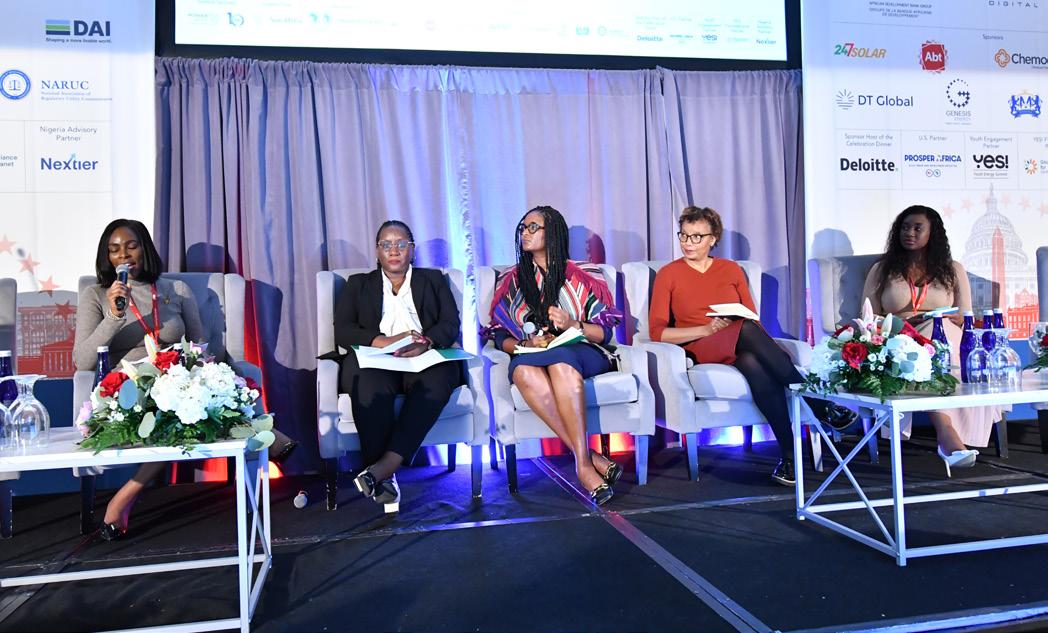
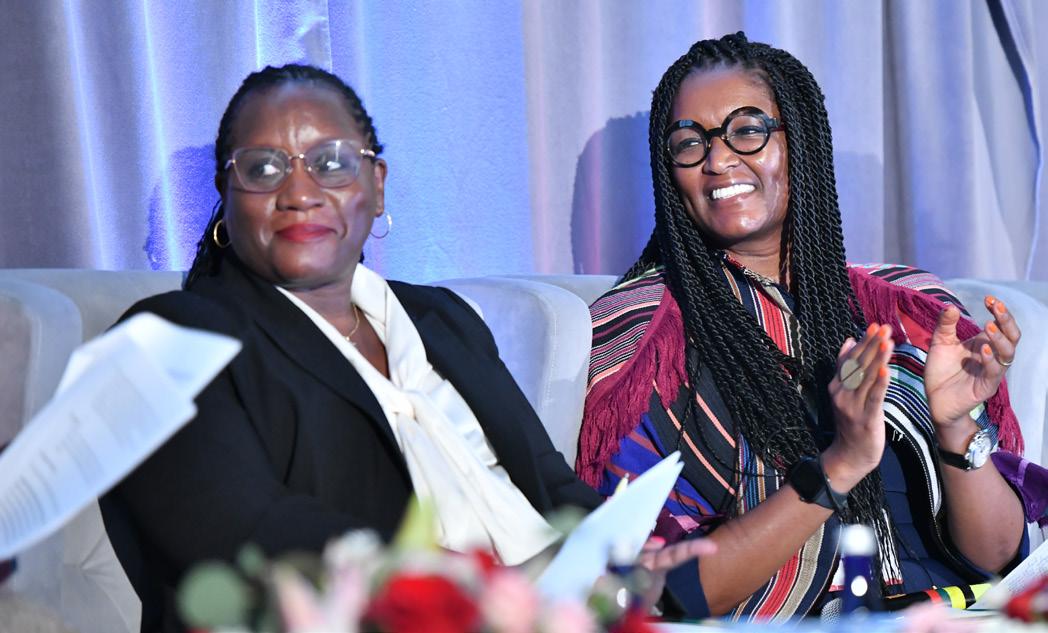

During this session, discussions centered on keeping promises that were made at ACS and COP28, accessing climate capital, and moving forward with the Nairobi Declaration.
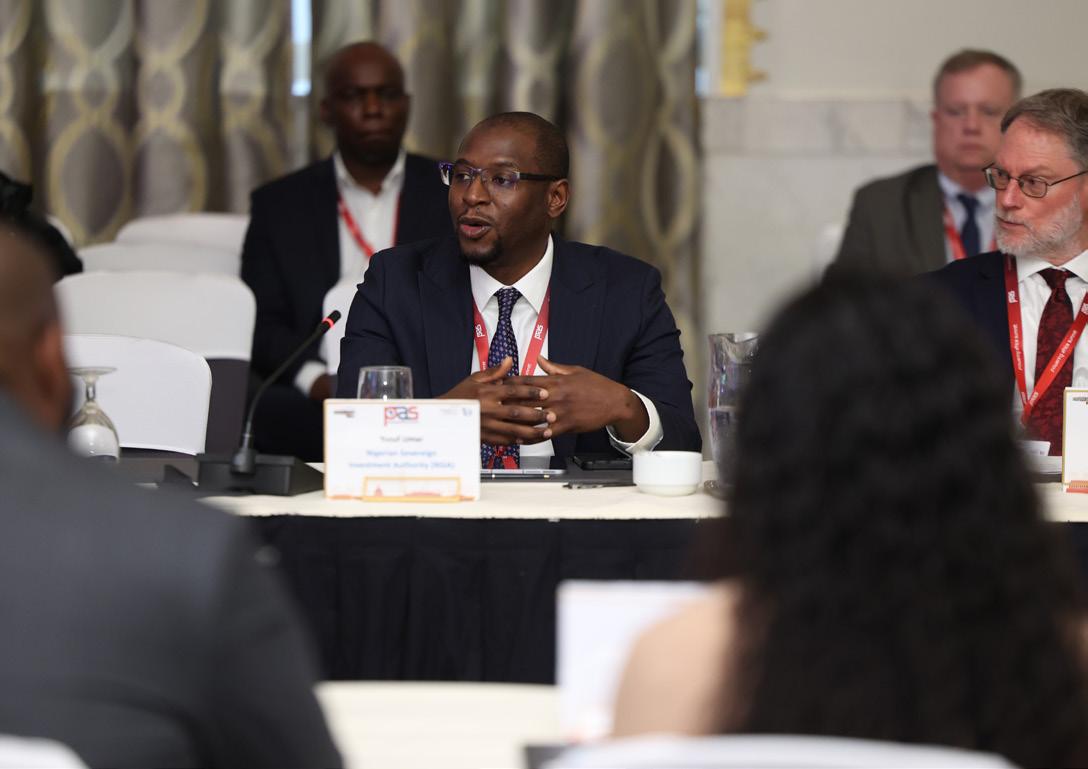
The panel discussed the benefits of a broader perspective, beyond climate finance, and a more holistic sustainable finance approach. Proper project implementation is essential, together with leveraging local solutions to facilitate financial flow, especially concerning currency needs. Countries may need to establish dedicated institutions for this purpose, and the inverse relationship between risk and capital to be addressed.
Companies engaged in decentralized, renewable energy projects face challenges. Often located in remote rural communities, with minimal economic activities, it is difficult for them to demonstrate their bankability. Macroeconomic issues such as fluctuations in local currency can also hamper investment – major equipment purchases may be made in foreign currency, while the electricity generated is consumed in local currency. Plus, many companies in rural communities lack portfolios of past projects, healthy balance sheets, or evidence of successful capital raises. It was suggested that grant subsidies and financial instruments, such as forgivable loans and project development finance, equipment finance, construction finance, and collaborative support from key stakeholders, would significantly help address the challenges. With a lack of knowledge on how to access funds effectively, the establishment of a universal ID facility for companies to receive subsidies through a results financing facility could enable them to secure the necessary capital investment.
The value of training and support from development partners (DPs) such as GIZ and Power Africa, and the contribution this has made to the success of companies was highlighted. Financial assistance, along with technical support, to train local companies in project development is crucial for accessing funds. Particularly in Nigeria, there was an emphasis on viewing power as a business rather than merely a social service. This perspective called for an enabling environment provided by the government to attract investors.
Projects can suffer from inadequate maintenance if left solely to local companies for management. The importance of capacitating both government and private sector institutions in the very early stages of program and project planning was stressed, to ensure the sustainability of investments and their benefits.


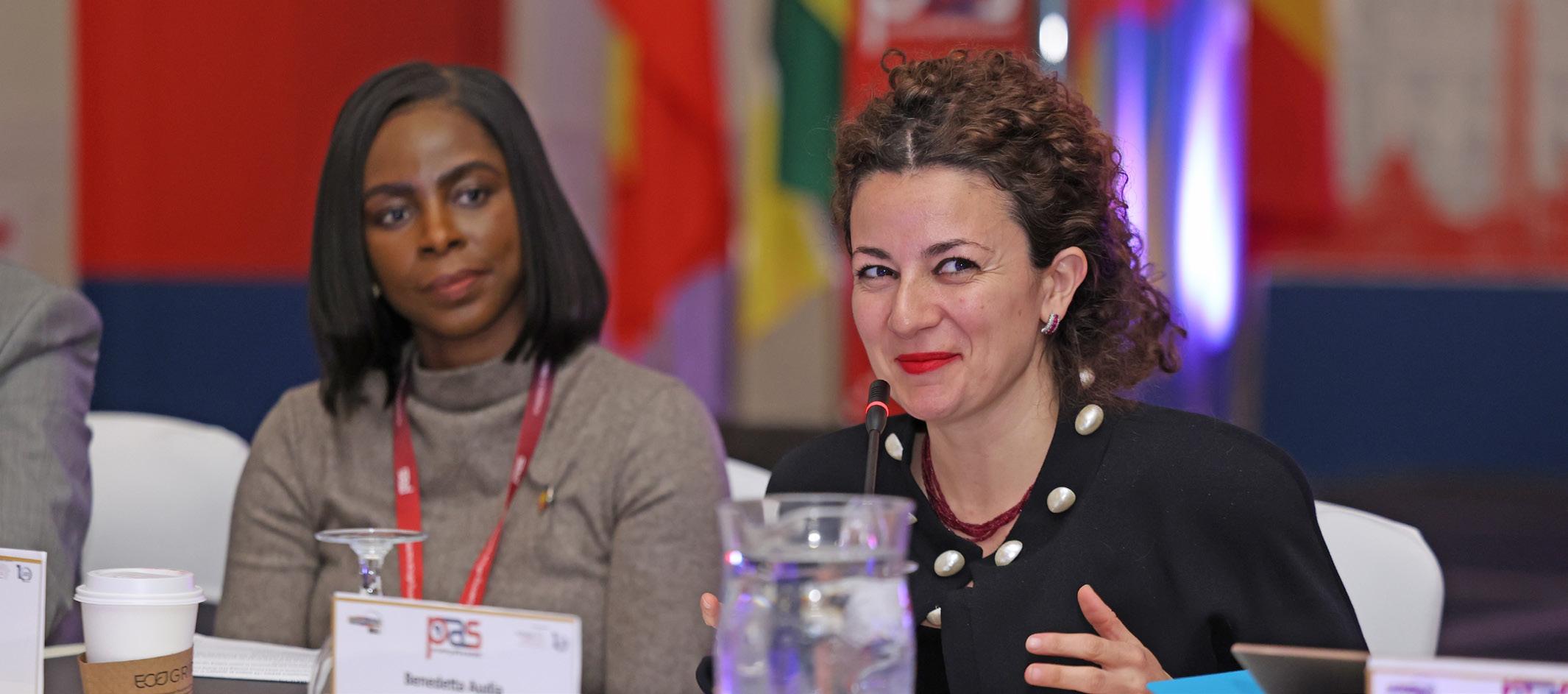
Tackling climate change and its impact is crucial for reducing poverty in Africa. It was noted that integrating climate change into poverty reduction goals can be important to secure financial support.
Concerns were raised about the outcomes of the Nairobi declaration and the Africa Climate Summit, pointing to a lack of significant achievements following these declarations, despite their intended purpose of facilitating capital flows to the continent. The importance of harmonizing challenges across countries was stressed.
It was suggested that the establishment of a carbon market could potentially reduce project costs by up to 10% in Africa. The urgency of addressing supply chain issues in the minerals sub-sector to mitigate mineral exploitation rates in Africa was emphasized, together with the importance of focusing on manufacturing to provide the necessary materials for energy transmission and transition across the continent.
While Africa’s contribution to climate change is significantly less than that of the developed world, the effects of climate change on the continent are some of the most evident. Appropriate support from the contributors to climate change is needed, as well as private sector engagement to welcome key organizations to the fight against climate change.
For Africa to fully benefit from the promised new climate finance, initiatives must begin from a grassroots level. With a lack of awareness among young people of developments in the energy sector, the importance of involving them in high-level discussions across all value chains in the energy sector was stressed.
All sessions conducted under the Chatham House Rule must maintain confidentiality and not disclose the identities or affiliations of speakers and other participants during all sessions.
Author: David Kodua, Graduate Assistant, National Development Planning Commission, Ghana
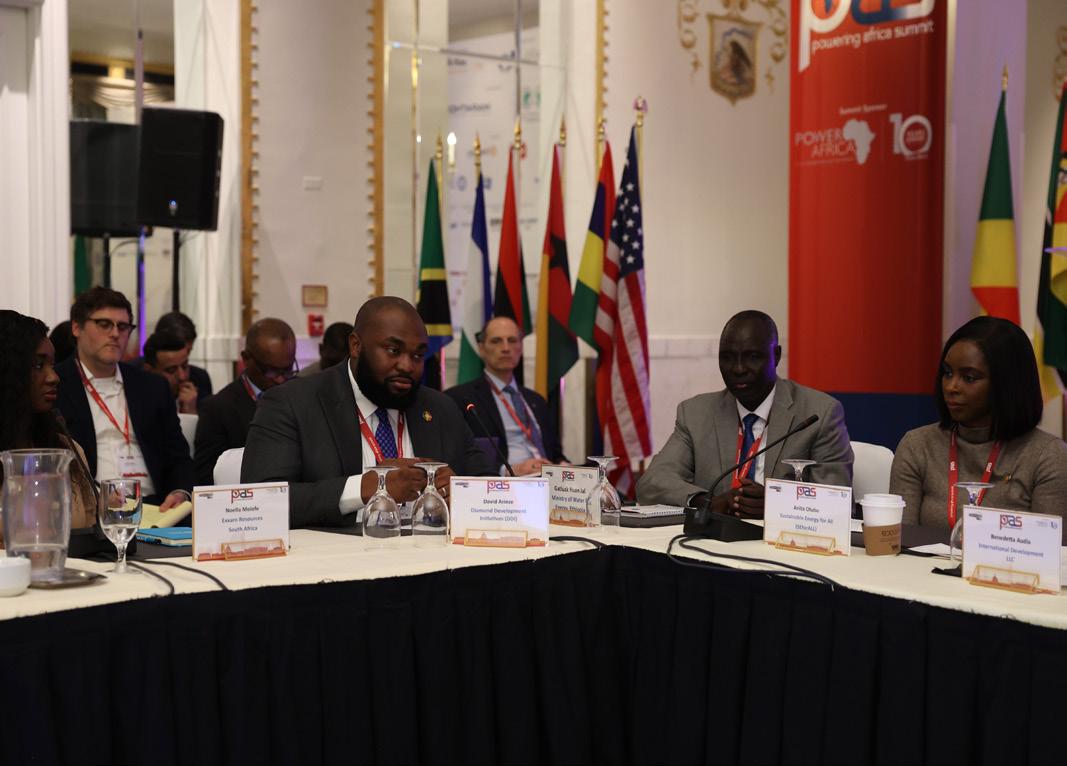

Hosted Boardroom: Hosted by
Speakers:
• Frannie Leautier, Senior Partner & CEO, SouthBridge Investment & Director, Global Energy Alliance for People and Planet (GEAPP)
• Kate Steel, Co-Founder and CEO, Nithio
• Melissa Persaud, Vice President, Fraym
• Celina Lee, Co-Founder & CEO, Zindi
• Aline Varre, Director of Strategy & Business Development, The Foundation for Partnership Initiatives in the Niger Delta (PIND Foundation)
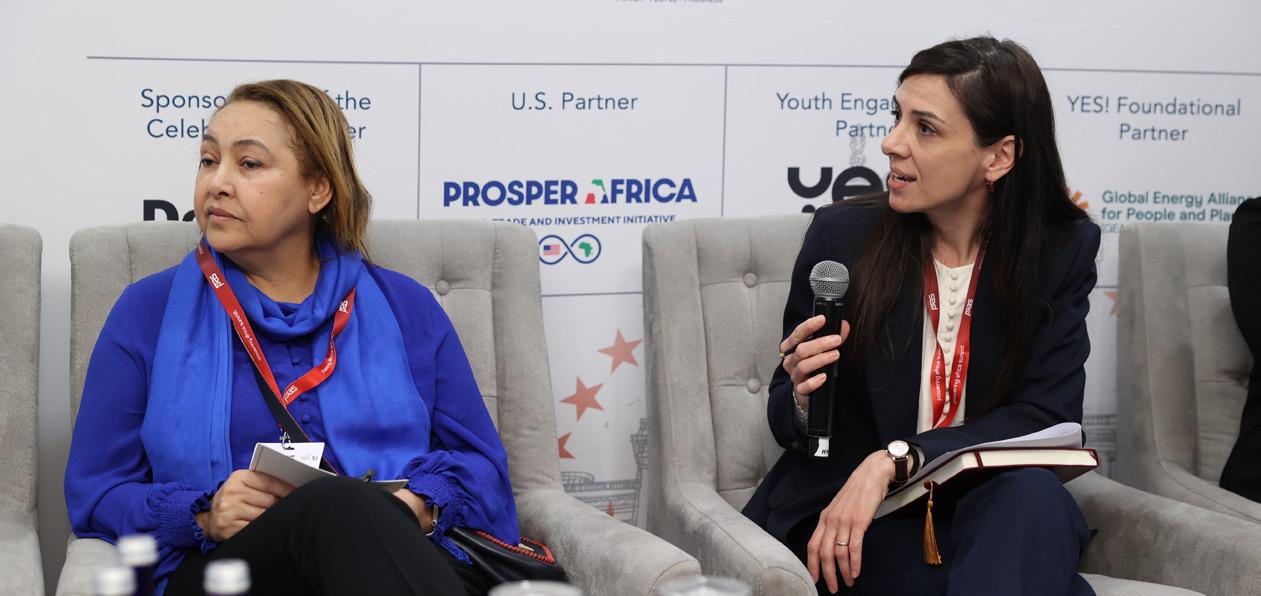
The general theme of the session was how to use data to reduce the cost of capital and spur investment in decentralized grid solutions. The panel provided an overview of how new geospatial data sets from Fraym are being used to reduce costs on the continent, including forecasting demand and cross-demand, modelling costs, and determining the creditworthiness of end users. The data has been used to organize patterns of behavior across the continent and grid. In addition to using the geospatial data for prediction and pattern organization, Nithio has innovated the lending system by using the geospatial data to conduct credit risk assessments down to the square kilometer. Nithio has been able to divide end users into tranches based on their repayment risk. This has allowed tailored financing to flow to these end users and transformed the pay-as-you-go lending space.
Most of the data has been used to model end-user behavior. As of now, there is limited transparency from IPPs and Offtakers on their tariffs and deal terms. The audience called for more transparency from IPPs and utilities to be able to use that data to move data-driven decision-making and lending up the value chain to the IPP level. This call has been met by Kenya Power who in a recent hydroelectric project released GPS data through a very transparent process. There are still improvements to be made in transparency and data collection at the IPP and utility level.
In addition to calling for more transparency and data, there was also a call for more philanthropic capital to step in for the “last mile” of development and help to close the financing gap. In line with the need for more data, there were also calls for more data science professionals on the Continent. Zindi is a startup platform that is helping to develop local data science talent and match up-and-coming data scientists with employment opportunities.
Author: Elizabeth Clinch, Penn State University


1,400+

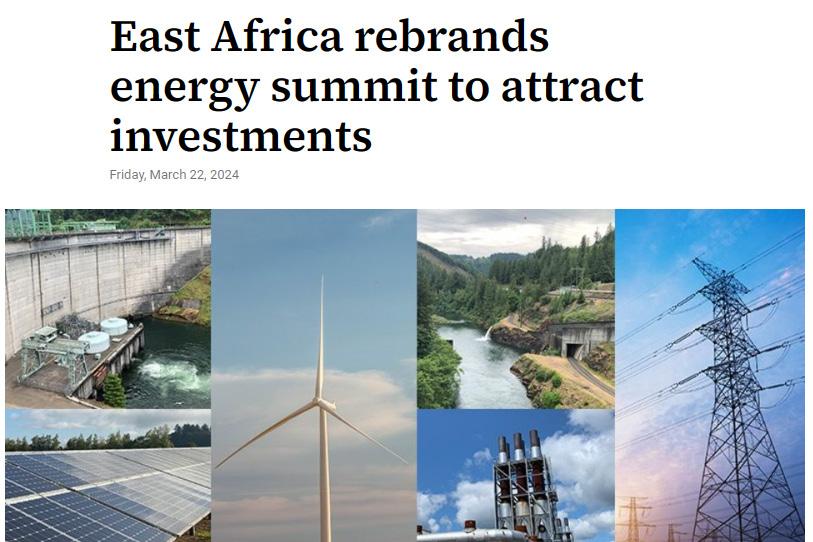
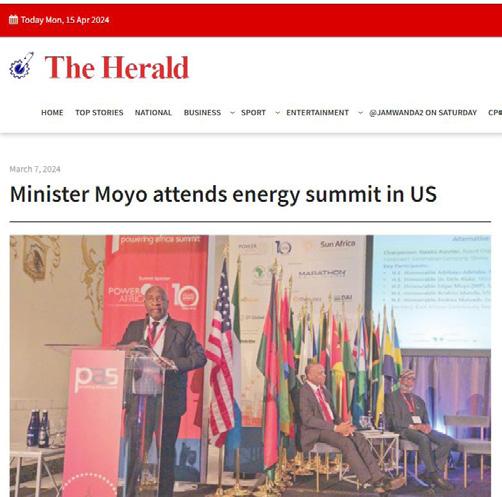
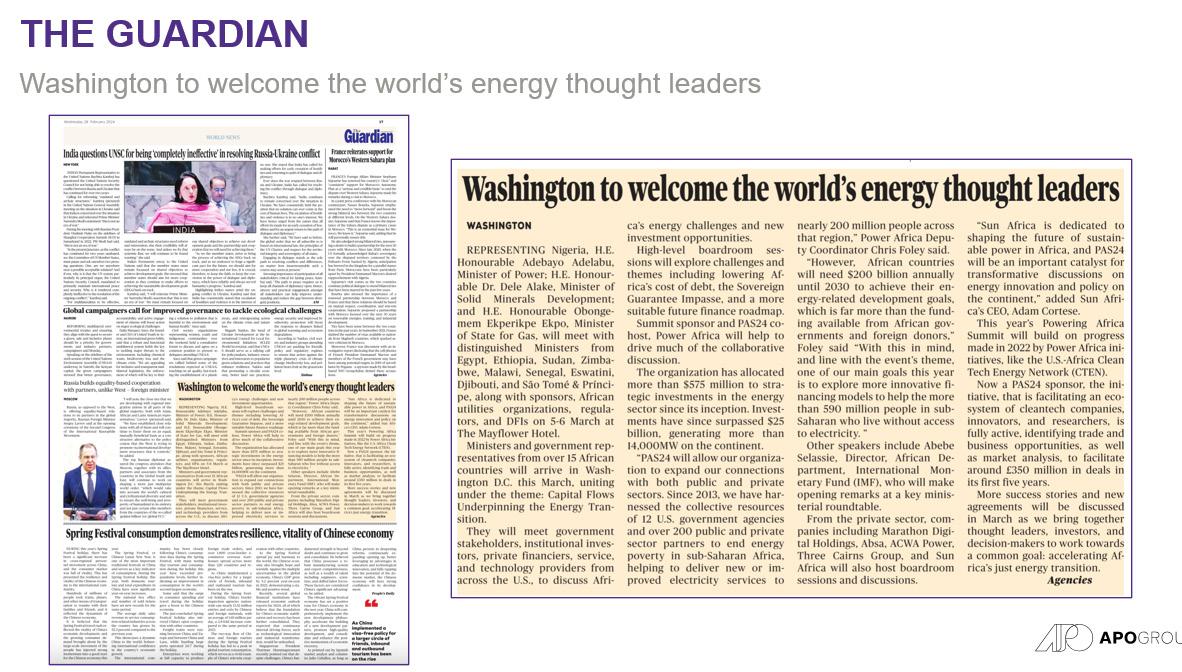
9,000+
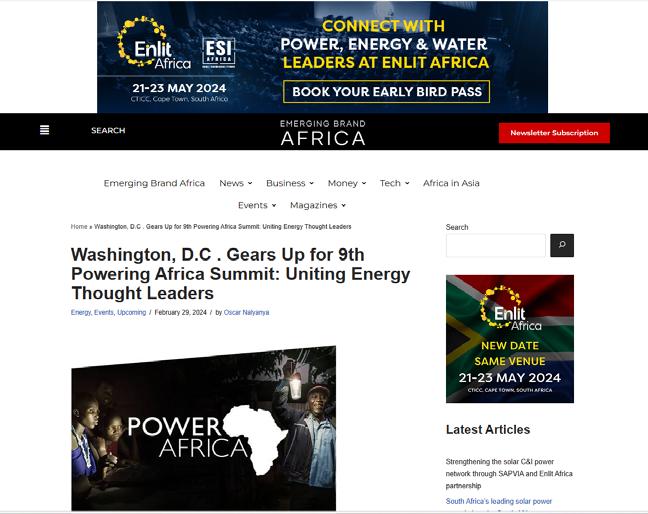
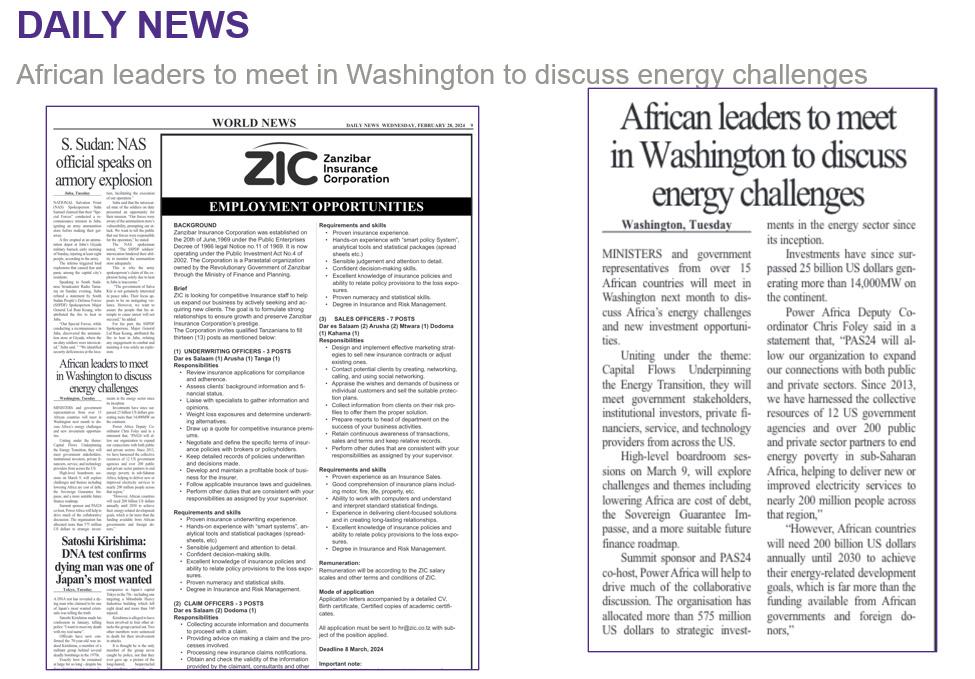

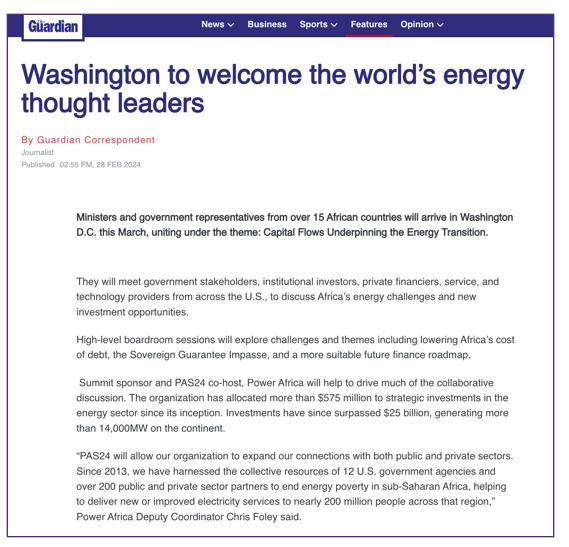
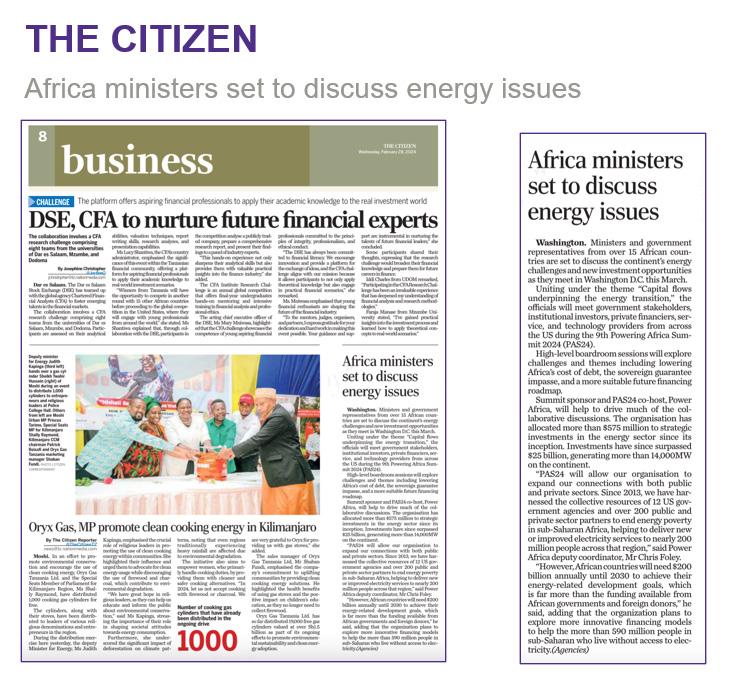
Over the years, the African Development Bank, a AAA-rated Multi-Lateral Development Bank in Africa, has participated and sponsored the Powering Africa Summit - a platform that the Bank has used to engage with U.S. Government stakeholders, institutional investors, private financiers and developers; and Ministers/Government officials from the Bank’s member countries, on topical issues pertaining to Africa’s energy sector. At PAS 2024, the Bank will use the opportunity to advance dialogue on the unique characteristics underpinning Africa’s Energy Transition to the global stage and display its leadership role in partnering its member countries to develop innovative mechanisms that guarantee Africa’s energy security, whilst also addressing climate change challenges along the journey to achieving net zero.

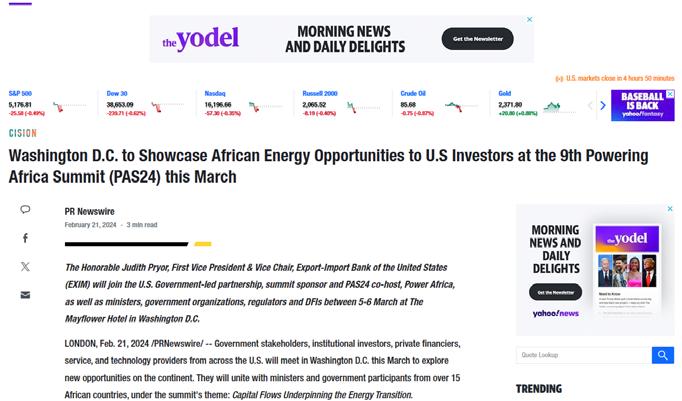
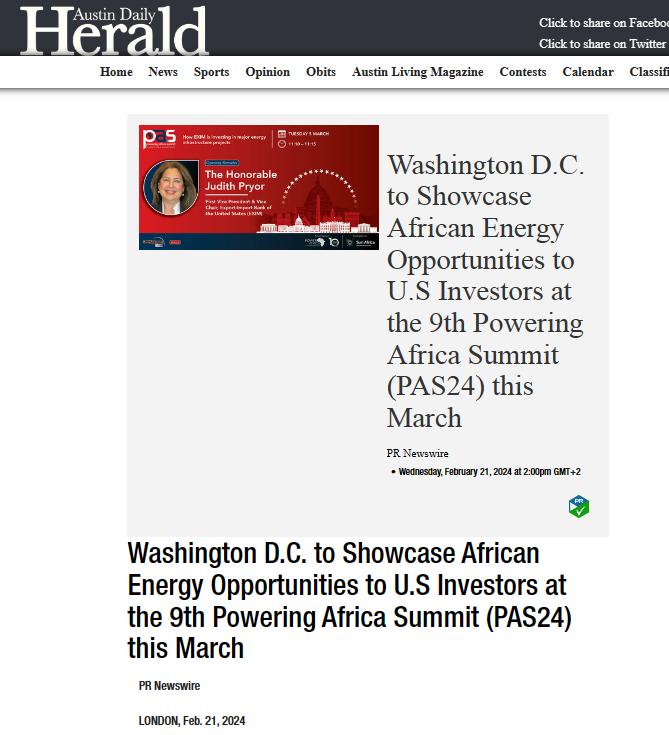
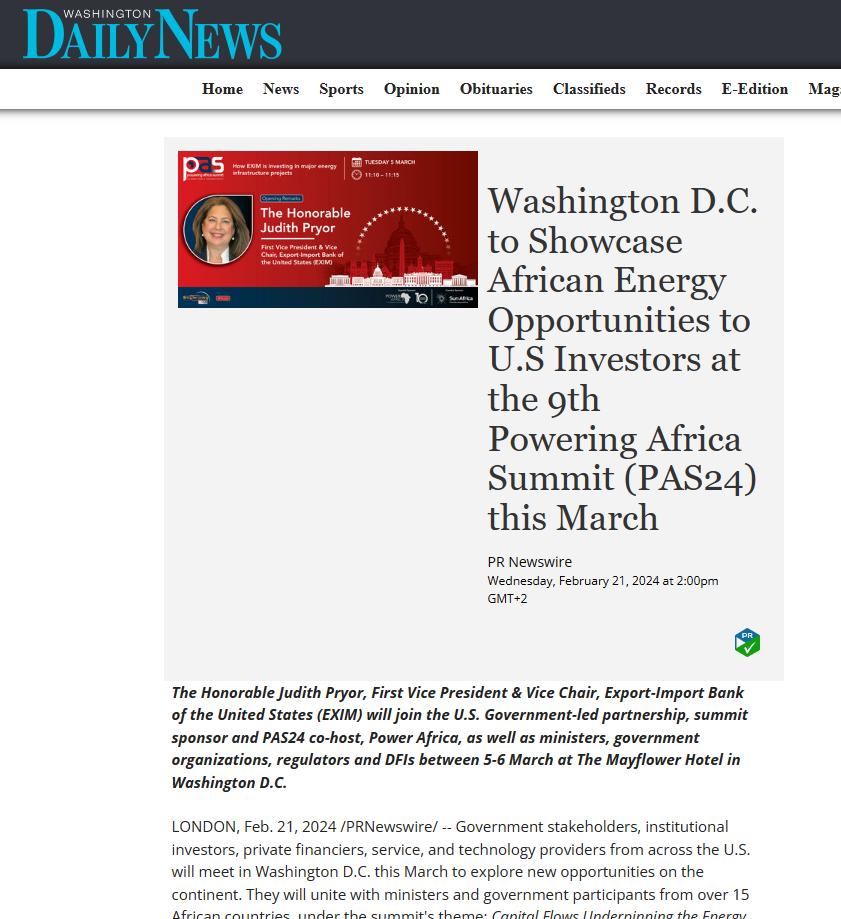
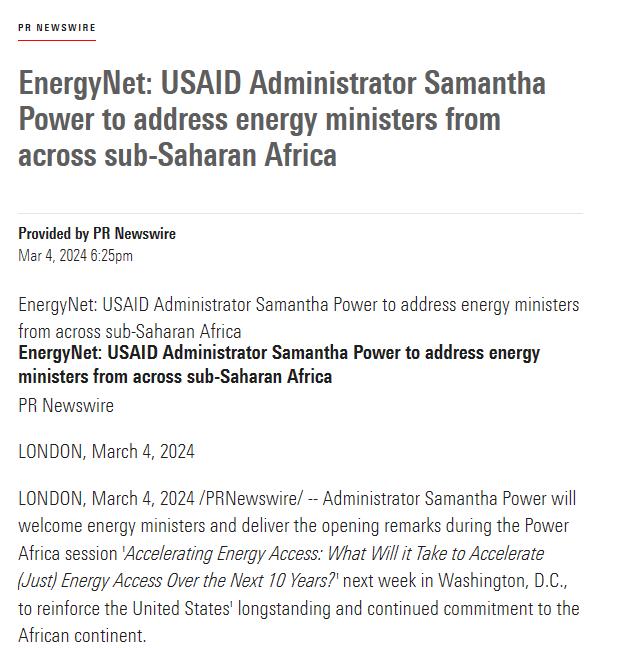
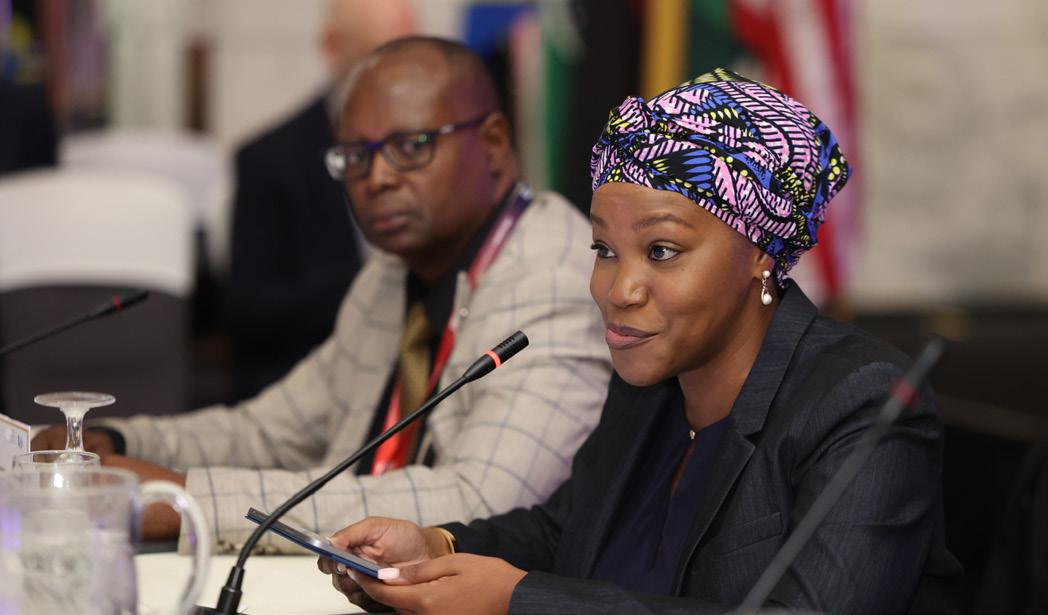
Memorable and insightful!
Evans Twaambo Deputy Company Secretary, ZESCO Limited Zambia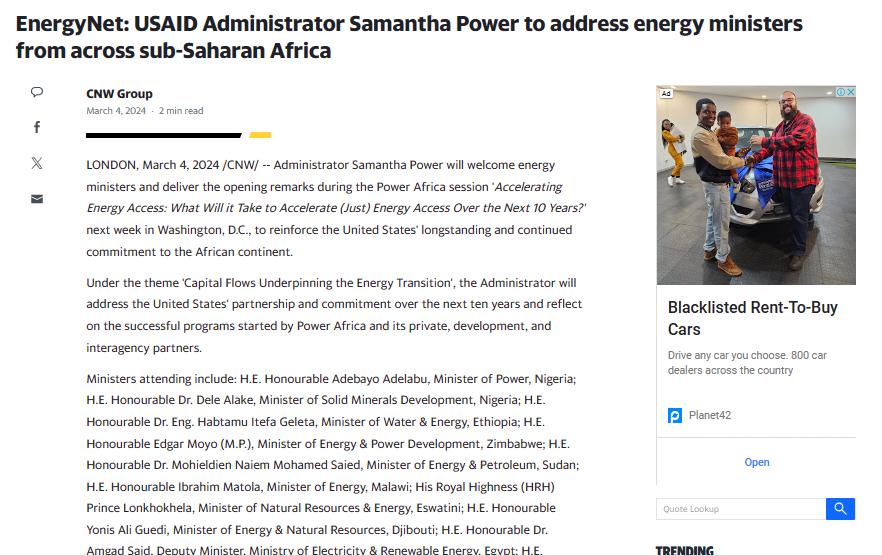
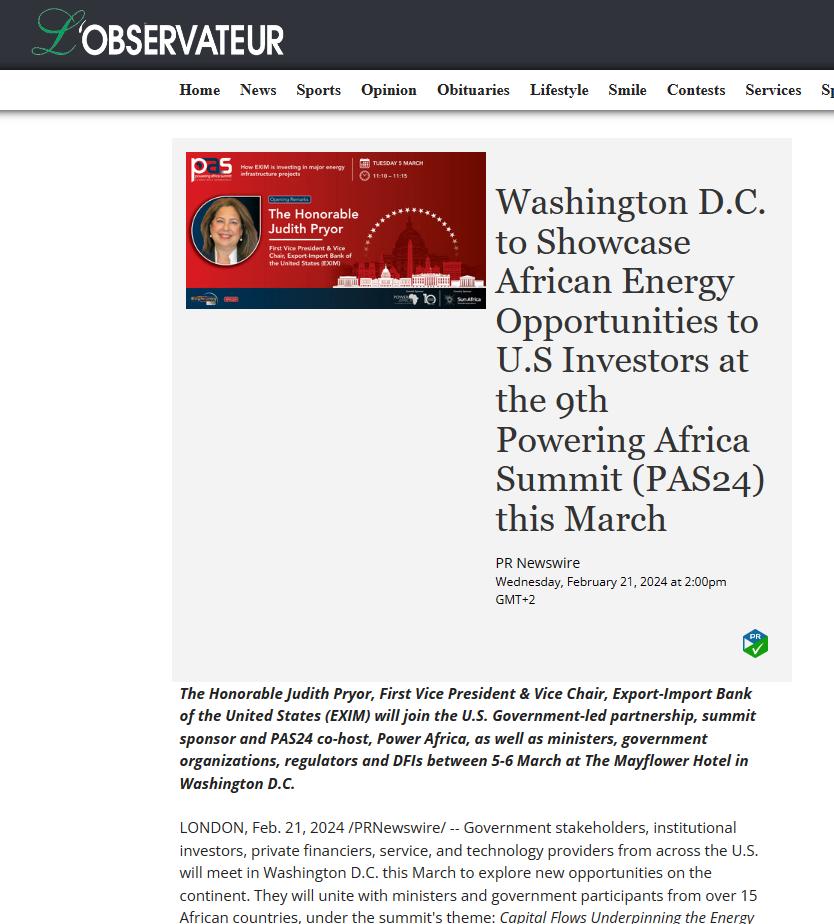
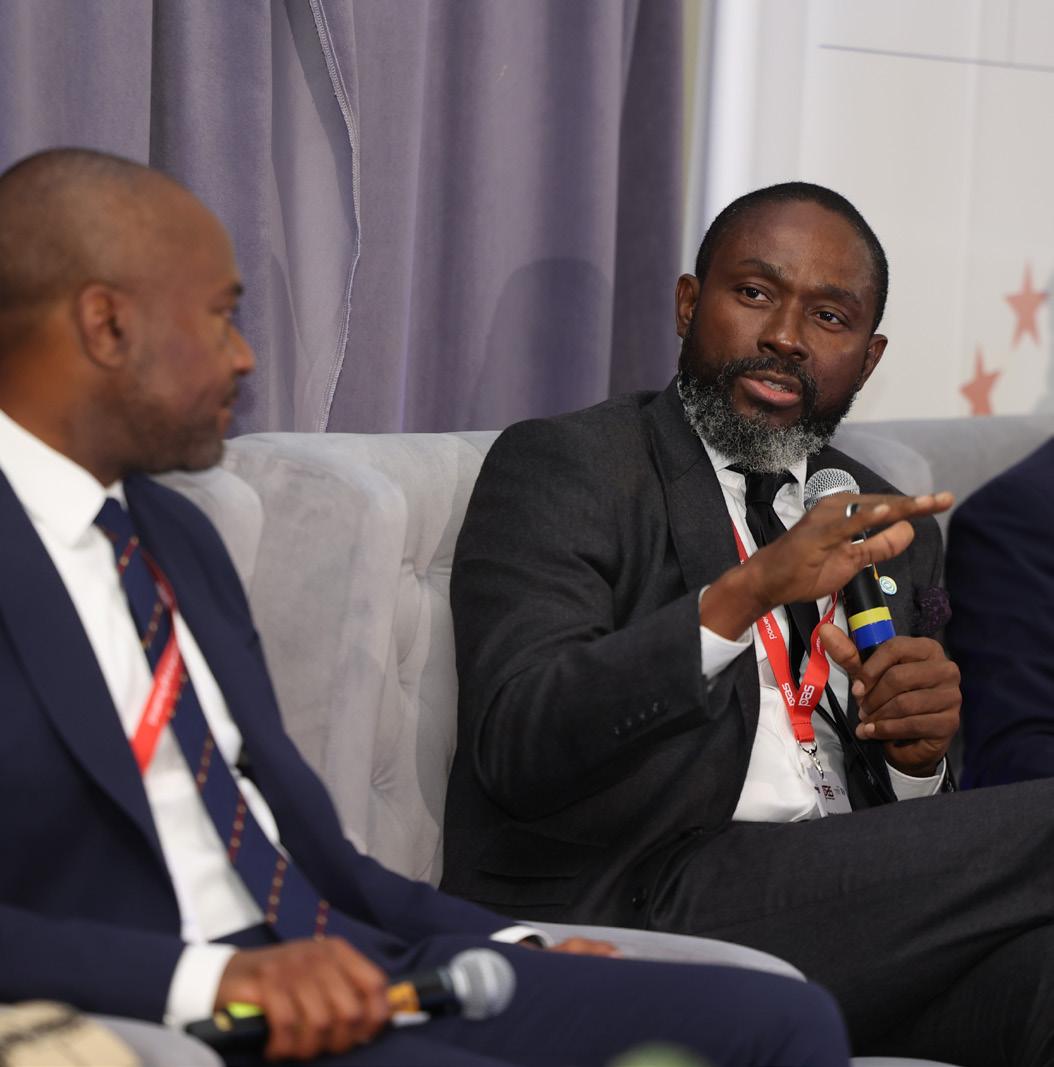


Ministers and government representatives from over 15 African countries will arrive in Washington D.C. this March, uniting under the theme: Capital Flows Underpinning the Energy Transition.
They will meet government stakeholders, institutional investors, private financiers, service, and technology providers from across the U.S., to discuss Africa’s energy challenges and new investment opportunities.
High-level boardroom sessions will explore challenges and themes including lowering Africa’s cost of debt, the Sovereign Guarantee Impasse, and a more suitable future finance roadmap.
Summit sponsor and PAS24 co-host, Power Africa will help to drive much of the collaborative discussion. The organization has allocated more than $575 million to strategic investments in the energy sector since its inception. Investments have since surpassed $25 billion, generating more than 14,000MW on the continent.
“PAS24 will allow our organization to expand our connections with both public and private sectors. Since 2013, we have harnessed the collective resources of 12 U.S. government agencies and over 200 public and private sector partners to end energy poverty in sub-Saharan Africa, helping to deliver new or improved electricity services to nearly 200 million people across that region,” Power Africa Deputy Coordinator Chris Foley said.
“However, African countries will need $200 billion annually until 2030 to achieve their energy-related development goals, which is far more than the funding available from African governments and foreign donors,” Foley said “With this in mind, and line with the event’s theme, one of our main goals this year is to explore more innovative financing models to help the more than 590 million people in sub-Saharan who live without access to electricity. ”
Other speakers include Abebe Selassie, Director, African Department, International Monetary Fund (IMF), who will make opening remarks at a key ministerial roundtable. From the private sector, companies including Marathon Digital Holdings, Absa, ACWA Power, Three Cairns Group, and Sun Africa will also host boardroom sessions and discussions.
“Sun Africa is dedicated to shaping the future of sustainable power in Africa, and PAS24 will be an important catalyst for transformative discussions on energy innovation and policy on the continent,” added Sun Africa’s CEO, Adam Cortese.
This year’s Powering Africa Summit will build on progress made in 2022 by Power Africa initiatives, like the U.S.-Africa Clean Tech Energy Network (CTEN). Now a PAS24 sponsor, the initiative, that is facilitating an ecosystem of cleantech companies, innovators, and researchers, is fully active, identifying trade and business opportunities, as well as market analysis, to facilitate around £350 million in deals in its first five years.
More success stories and new agreements will be discussed in March as we bring together thought leaders, investors, and decisionmakers to work towards a common goal: accelerating Africa’s just energy transition.
Source link: https://www.ippmedia.co.tz/the-guardian/features/read/washington-to-welcome-the-worlds-energy-thought-leaders


Leaders from over 15 African countries will meet with U.S. stakeholders to discuss how to ensure the continued, equitable growth of renewable energy projects in each country.
This year’s Powering Africa Summit (PAS) will explore the theme, “Capital Flows Underpinning the Energy Transition.” U.S. government stakeholders, institutional investors, private financiers, and service and technology providers will host ministers from over 15 African countries in Washington, D.C., to discuss energy investment opportunities and assess current policy surrounding equitable access to renewable energy in each country.
Conversations will explore how to lower Africa’s cost of debt to support the region’s ability to ensure a climate-resilient future. Participants will discuss alternative solutions to sovereign guarantees so investors maintain insurance against defaulted payments due to country-specific risks.
Stakeholders will also assess how donors and development banks can best support Nigeria in implementing the Nigeria Electricity Act (2023). It was signed into law in June of 2023 to demonopolize electricity generation and promote power produced by renewables.
Policymakers will discuss how to ensure the continued, equitable growth of renewable energy projects in each country. One such example is assessing the progress of Power Africa. The organization works with 49 countries across East, West, Central, and Southern Africa to provide equitable access to electricity through renewable energy. Power Africa is funded by the private sector, international development organizations and global governments.
Power Africa has allocated over $575 million to strategic investments in Africa’s energy sector since its launch in 2013. Examples include the organization’s route-to-market tool that provides visibility on population density, electrification, telecoms, and road infrastructure in Malawi, Mozambique, and Zambia so residential companies can find geographic markets. Following the COVID-19 pandemic, Power Africa launched Power Africa Powering Health in collaboration with African governments, its partners and the private sector to develop off-grid solutions that electrify health facilities across the continent.
Power Africa has also invested over $25 billion toward generating more than 140 GW of renewable energy plants across the region. They include installing 318 GW of South Africa’s 581 GW renewable energy portfolio, with solar projects comprising 232 GW. In Nigeria, Power Africa has helped install 3 GW of the country’s renewable energy portfolio, currently at 16 GW, with solar making up 7 MW.
Speakers include Abebe Selassie, the director of the African Department at the International Monetary Fund and private sector companies like SunAfrica. In June 2023, the Florida-based solar project developer was awarded the Deal of the Year, alongside the Ministry of Finance of the Republic of Angola, at the Export-Import Bank of the United States’ 2023 Annual conference. SunAfrica was recognized for its ability to support American jobs through exports. The organization was approved for a $907 million transaction to support the construction of two solar energy power plants in Angola. Both are expected to generate a combined total of over 500 MW of solar power nationwide.
The Powering Africa Summit will also hear from the Youth Energy Summit (YES!), comprised of African students, young entrepreneurs, and professionals. The organization scales education and professional opportunities in the African clean energy sector. During the summit, YES! will collaborate with stakeholders to draft a roadmap for electrifying the continent through learning and development initiatives and private and public corporation recruitment opportunities.
Source link: https://pv-magazine-usa.com/2024/02/22/investment-opportunities-in-africas-clean-energy-transition/

